
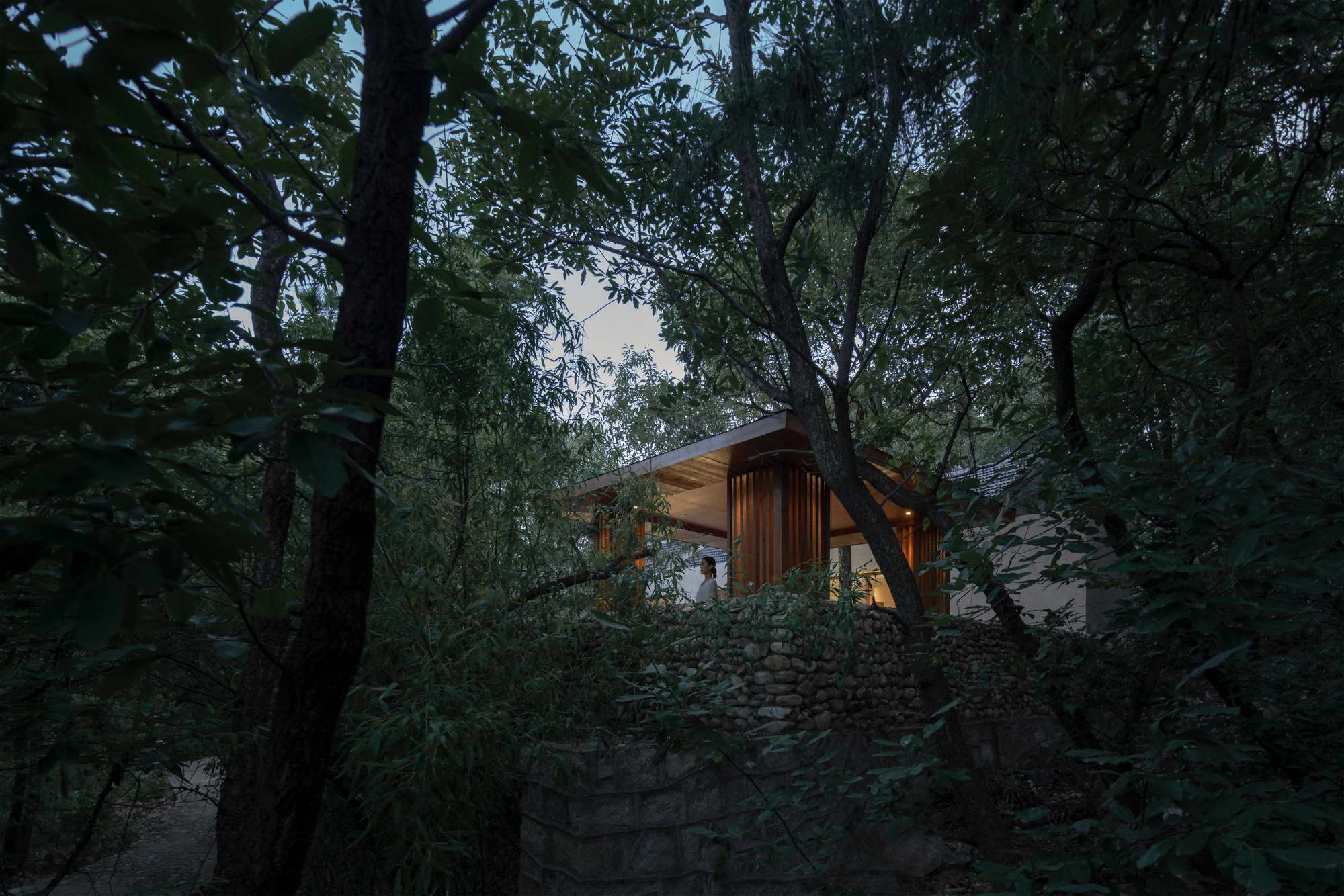
▲茶亭Tea Pavilion
项目缘起Project Origin
沂蒙人家二号院项目是对一个多年传统品牌酒店院落的改造,设计通过对建筑院落的保留与更新,在地材料的运用,光影氛围的营造,探讨传统院落空间的改造策略。
The Yimeng Renjia No. 2 Courtyard Resort project is a renovation of a traditional brand hotel courtyard which has run for many years. The design explores the renovation strategy of the traditional courtyard space through preserving and renewing the architectural courtyard, utilizing local materials, and creating the atmosphere of light and shadow.
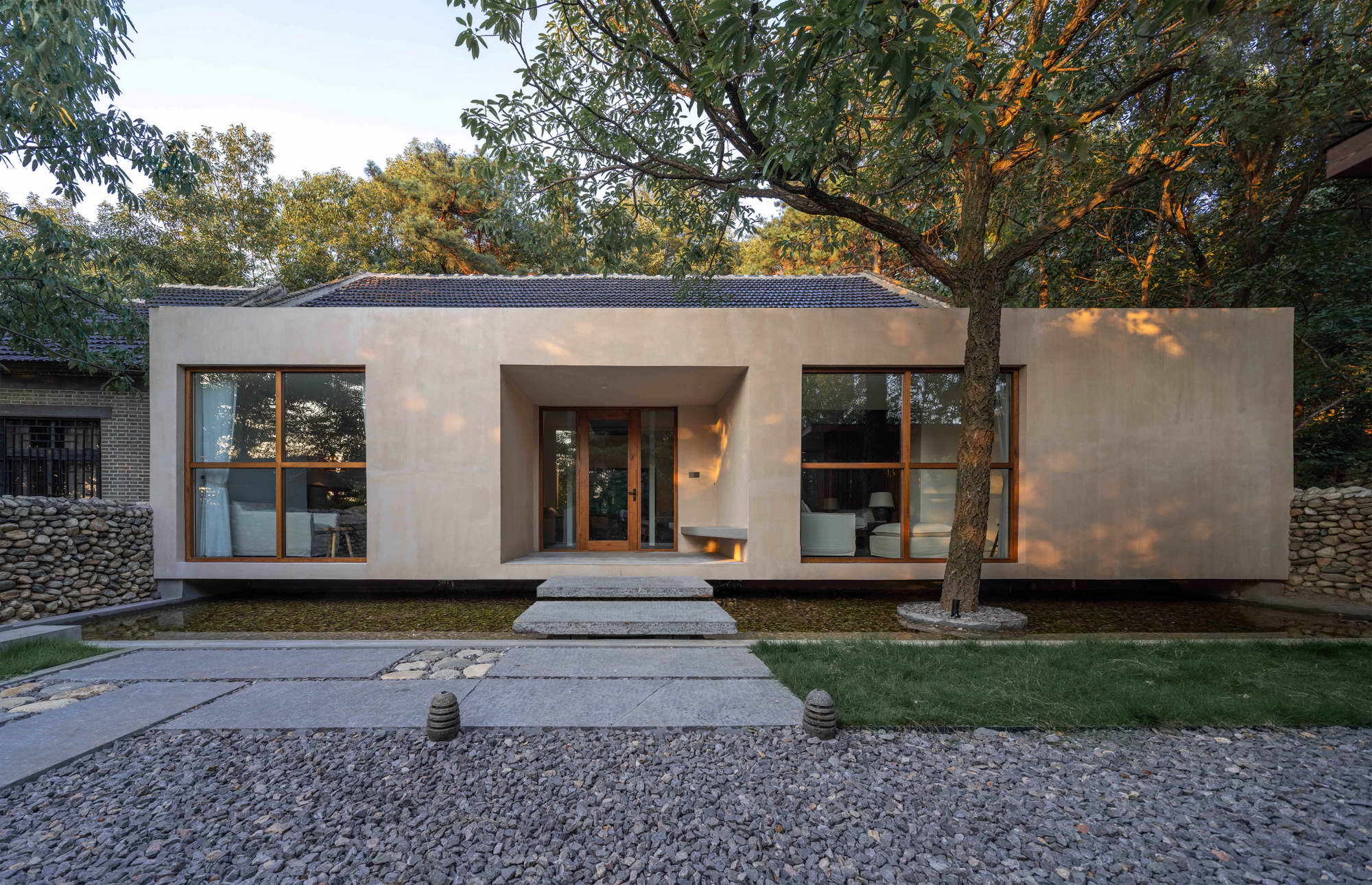
▲主房立面Facade of the Main House
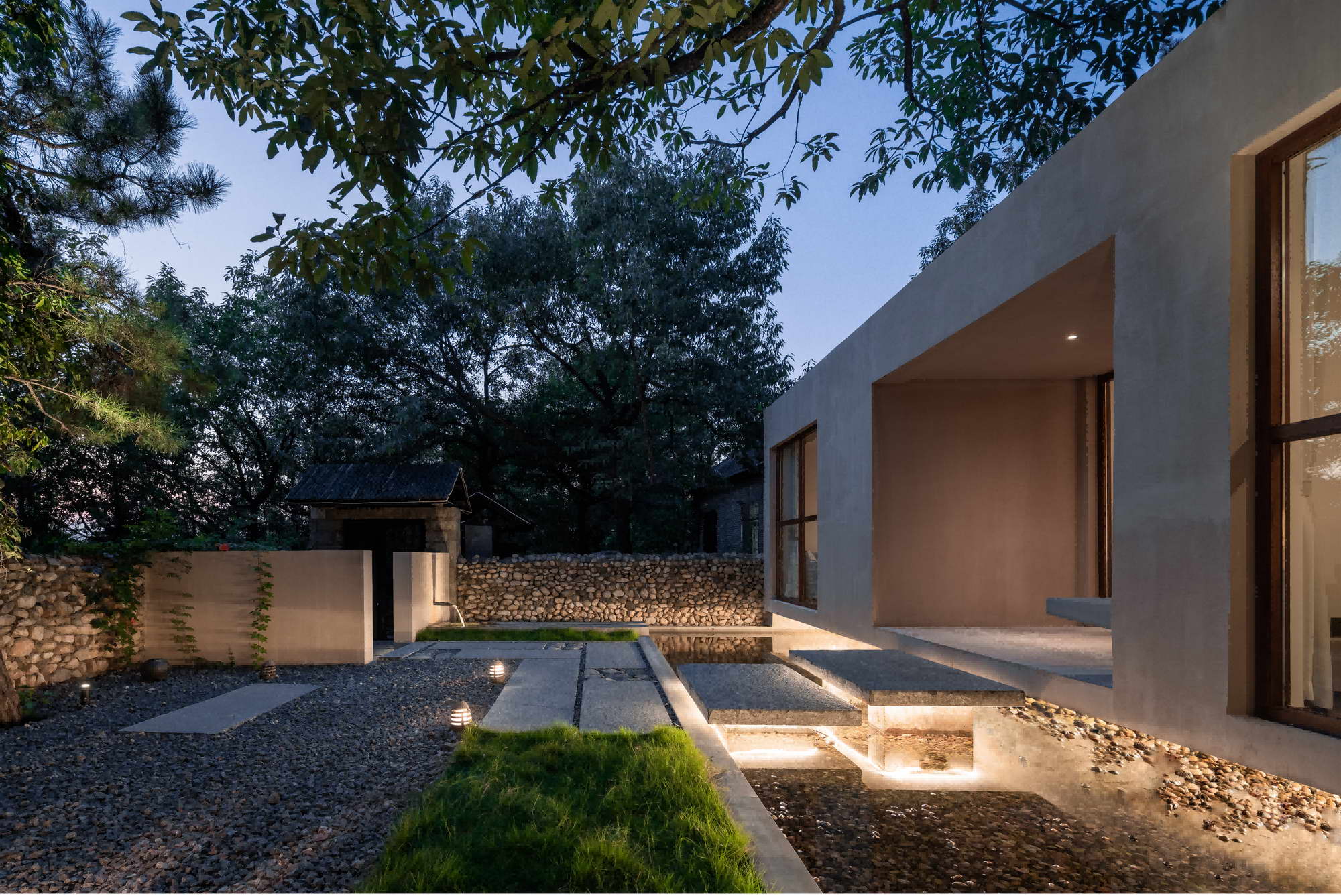
▲庭院透视Perspective View of Courtyard
著名书画家范曾先生在此入住后赞赏不已,为此酒店题名“沂蒙人家”,沂蒙人家酒店由此得名。沂蒙人家座落于蒙山旅游度假区龟蒙顶山脚下,是蒙山风景区内典型的北方院落式酒店,因年久酒店设施逐渐陈旧,由此决定首先对二号院进行提升改造。
Mr. Zeng Fan, the famous painter and calligrapher, admired the hotel a lot after staying here, and named the hotel as "Yimeng Renjia". That is how the Yimeng Renjia Hotel got its name. Yimeng Renjia Hotel is located at the foot of Guimengding Mountain in the Mengshan Tourist Resort, which is a typical northern courtyard hotel in the Mengshan Scenic Area. Due to disrepair over the years, the hotel facilities are gradually obsolete. Therefore, the no.2 courtyard was upgraded and transformed first.
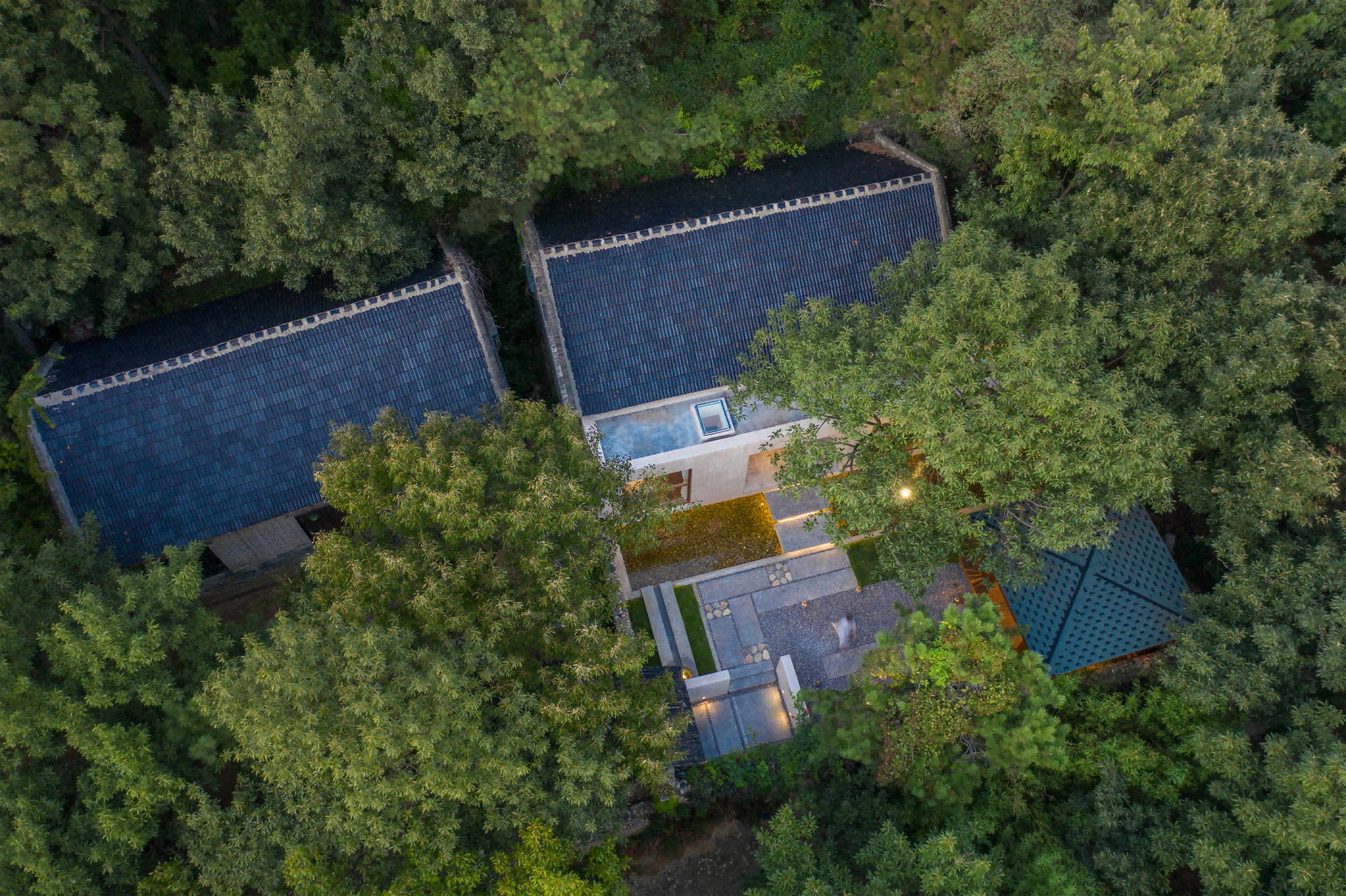
▲俯瞰图Aerial View
二号院现状院落及建筑于2002年建成,建造就地取材,建筑墙体基础使用了当地的青石,上面为青砖,围墙则是山谷遍地都是的卵石,整个院落具有当地民居特色,承载着沂蒙人家多年的记忆,也是当地传统院落式民居的一种典型,在设计初始即决定在保留院落和房屋主体结构的基础上进行适宜的植入和改造。
The current No. 2 courtyard were completed in 2002. The construction was made with local materials. Local bluestone was used as the foundation of the building wall, with blue bricks covering on the wall. And the surrounding walls were pebbles which scatter around in the valley. The entire courtyard possesses the characteristics of local dwellings and carries the memories of the Yimeng settlers for many years, which makes it a typical local traditional courtyard-style dwellings. At the beginning of the design, it was decided to conduct appropriate implantation and transformation on the basis of preserving the origin courtyard and the main structure of the house.
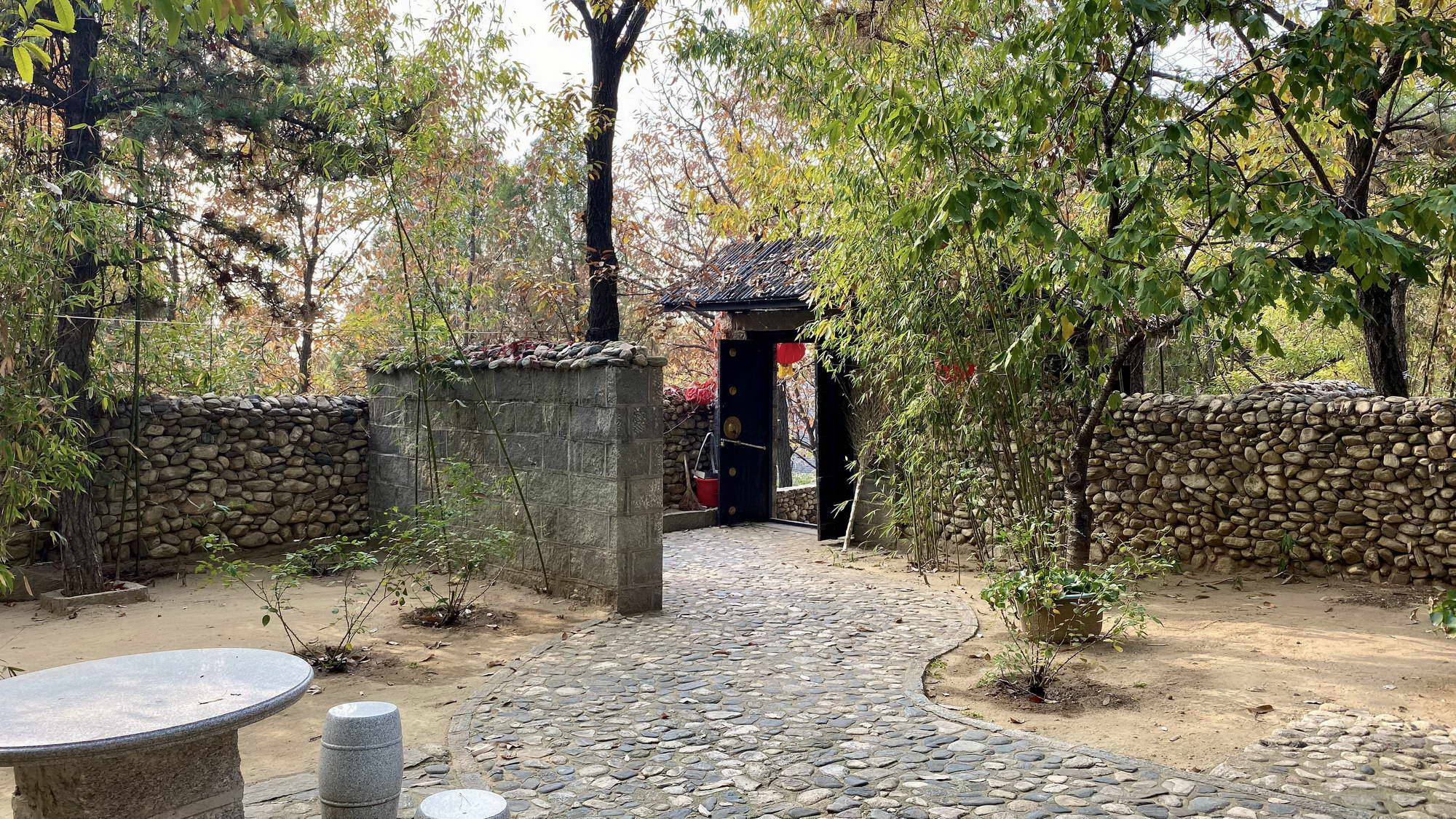
▲改造前看向入口The look of the Entrance Before Renovation
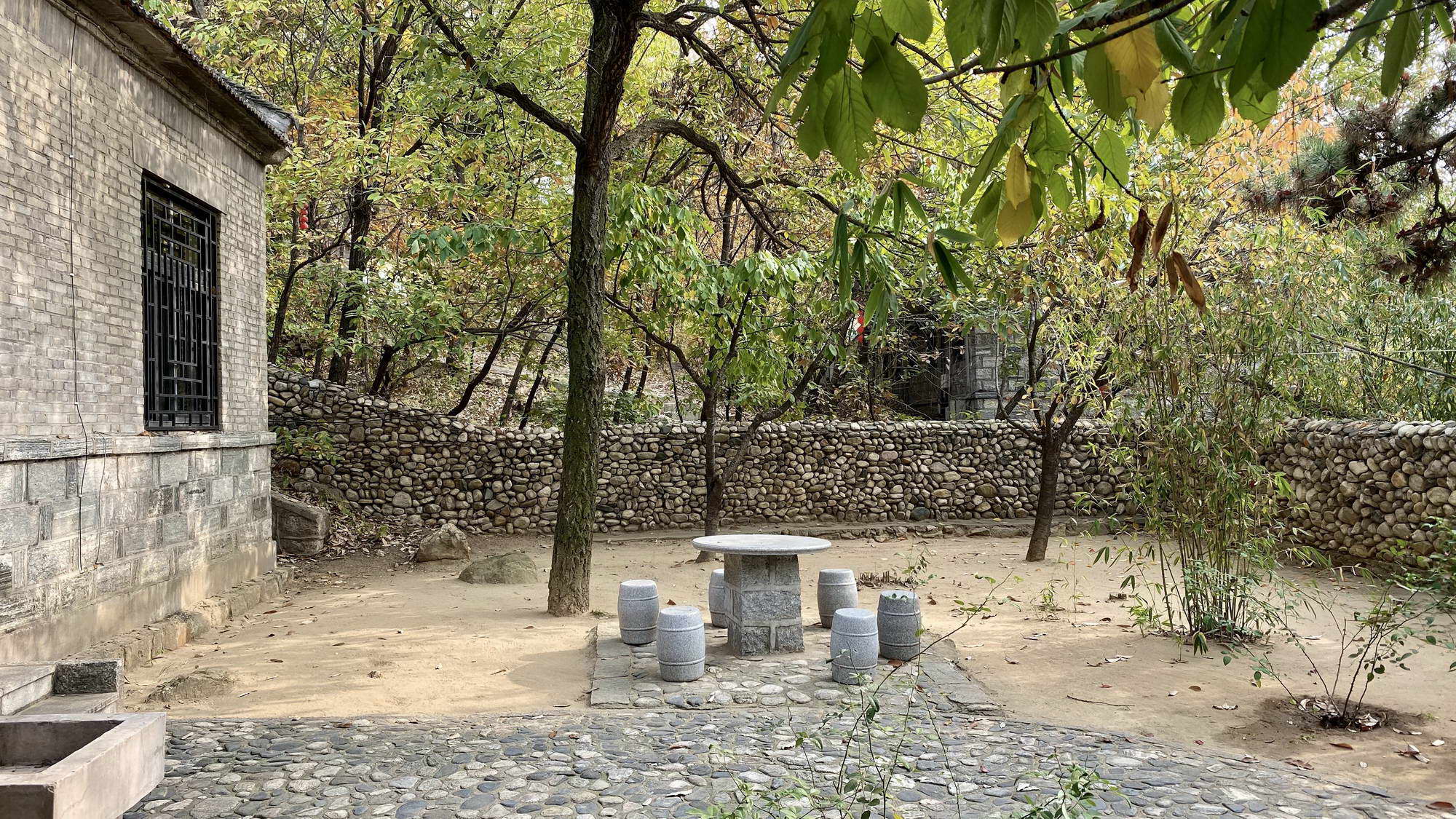
▲改造前庭院东侧East side of Courtyard Before Renovation
院落更新:空间重构Courtyard Renewal: Space Reconstruction
院落尺寸东西为15米,南北10米,入口与围墙现状较好且极具当地传统特色,因此将其完整地保留下来,留存了原有院落意境与氛围的记忆。
The size of the courtyard is 15 meters from east to west, and 10 meters from north to south. The entrance and surrounding walls are in good condition with excellent local traditional characteristics. Therefore, they are preserved intactly so as to preserve the memory of the original courtyard's artistic conception and atmosphere.
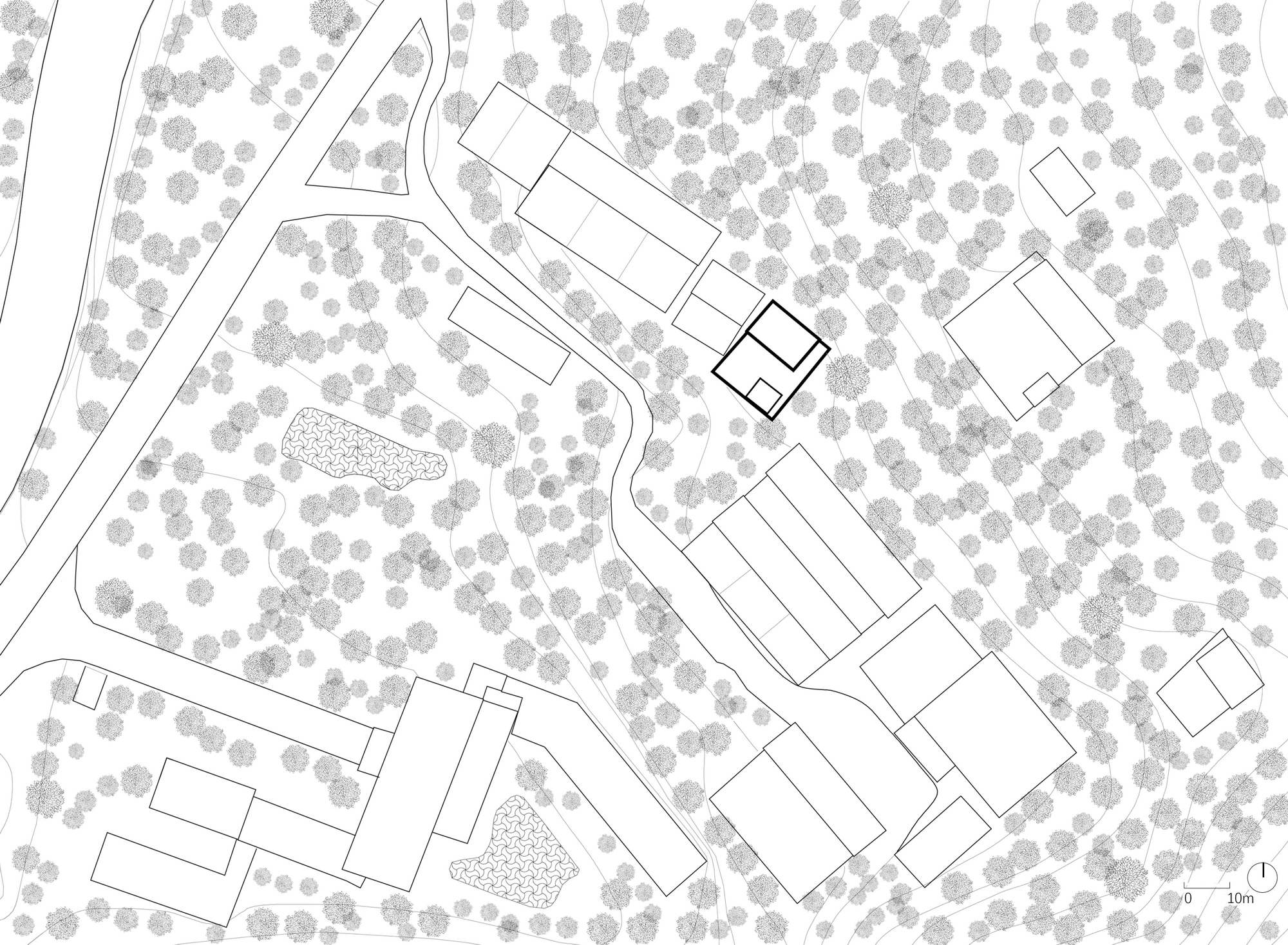
▲总平面图General layout
内部的座椅、绿植、树木及卵石路等元素则显得较为杂乱,对其进行了重新梳理后,保留了现状的两棵树木。
However, the seats, green plants, trees and pebble roads and other elements inside the courtyard are rather messy. After reorganizing above situation, the two trees of them are retained.
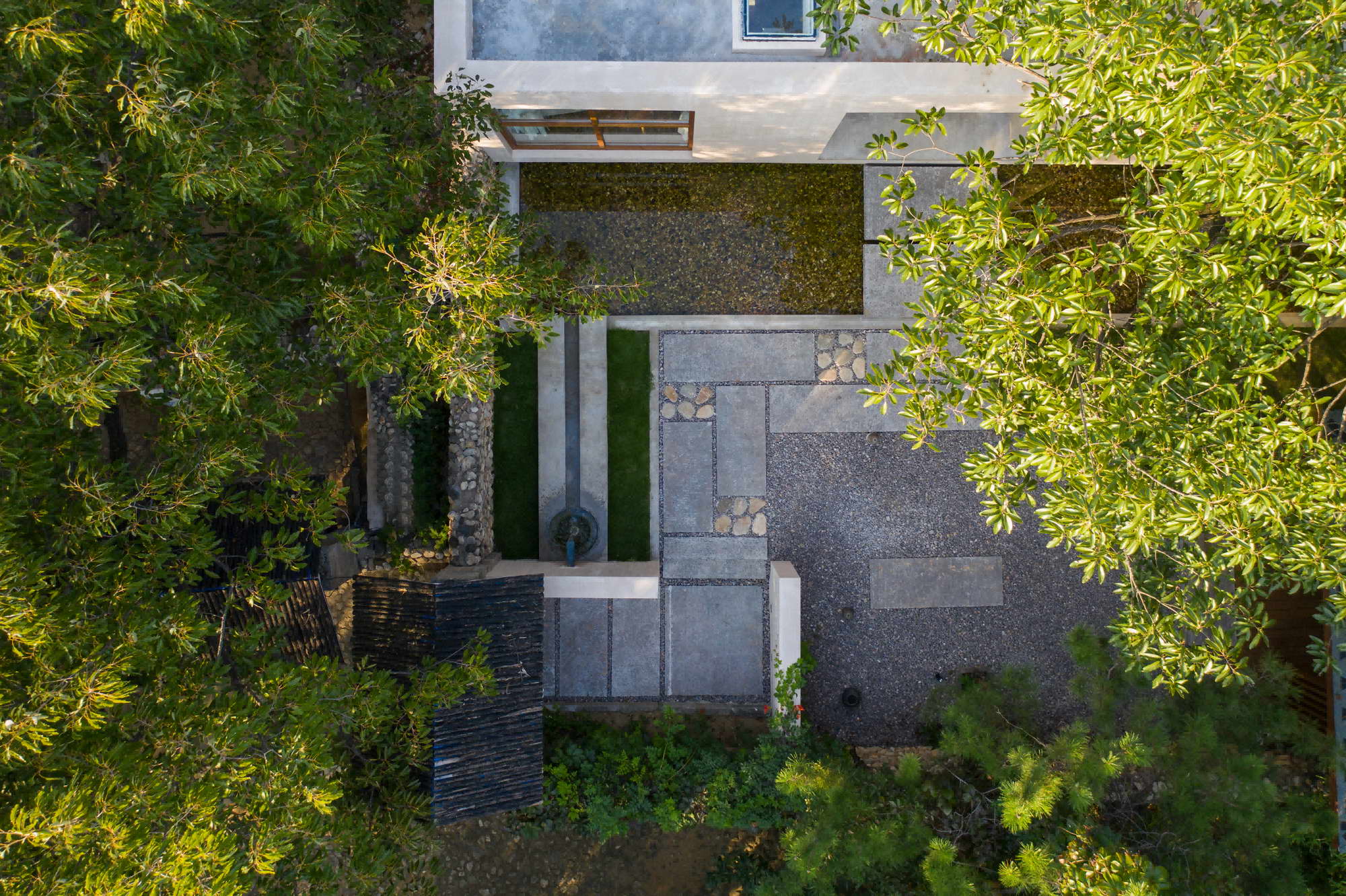
▲庭院俯瞰Aerial View of Courtyard
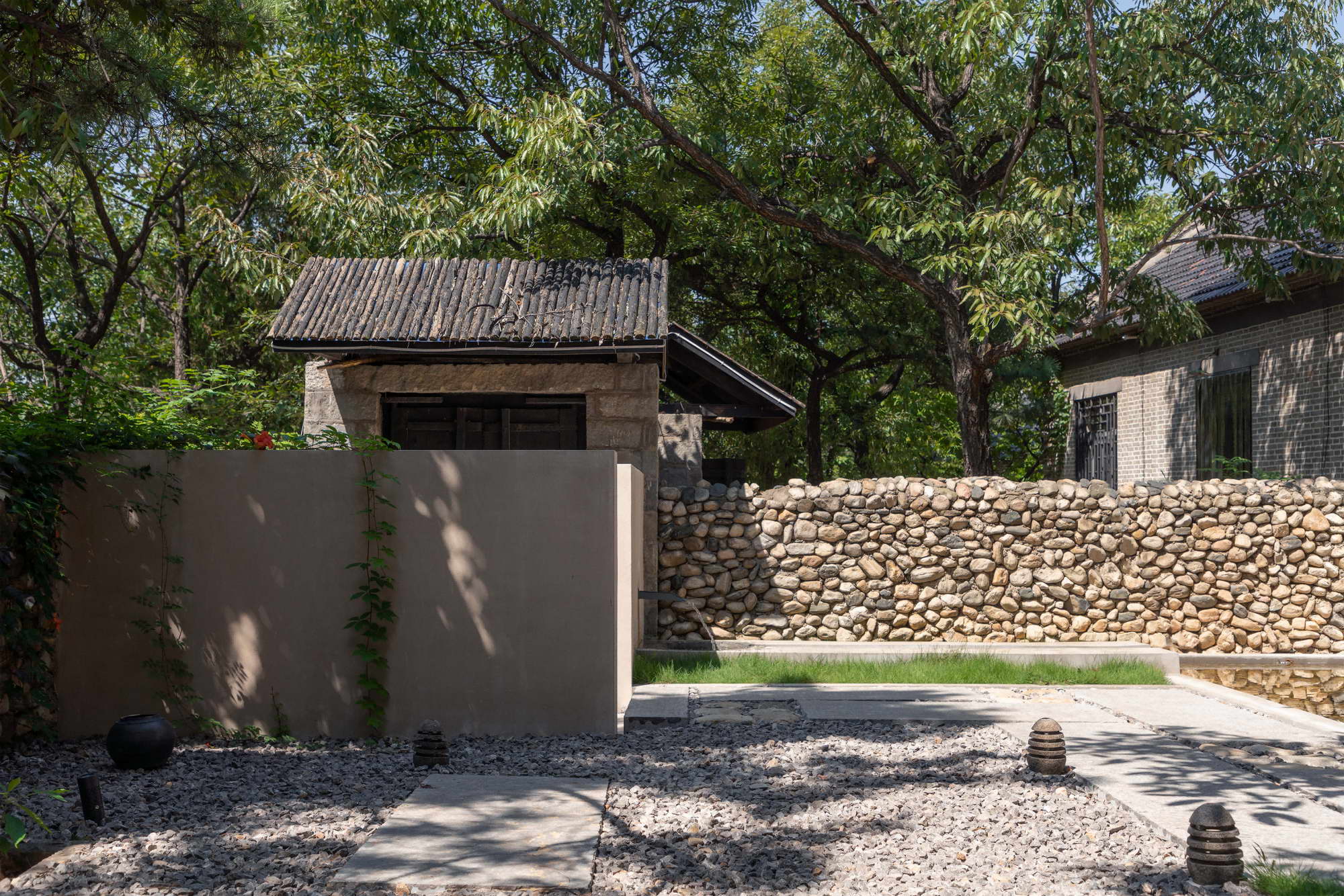
▲看向入口The Look of the Entrance
院落地面运用了当地的青石板和卵石,以新的铺贴形式形成了一条进入建筑的路径,在路径的一侧新建了一个茶亭,与院子里的树木及建筑形成一种新的空间对望关系,作为室内活动空间的延续。
Local bluestone slabs and pebbles are applied to build the ground of the courtyard, forming a path into the building in the manner of new paving. A tea pavilion is built on one side of the path, which forms a new spatial relationship with the trees and buildings in the yard, as a continuation of the indoor activity space.
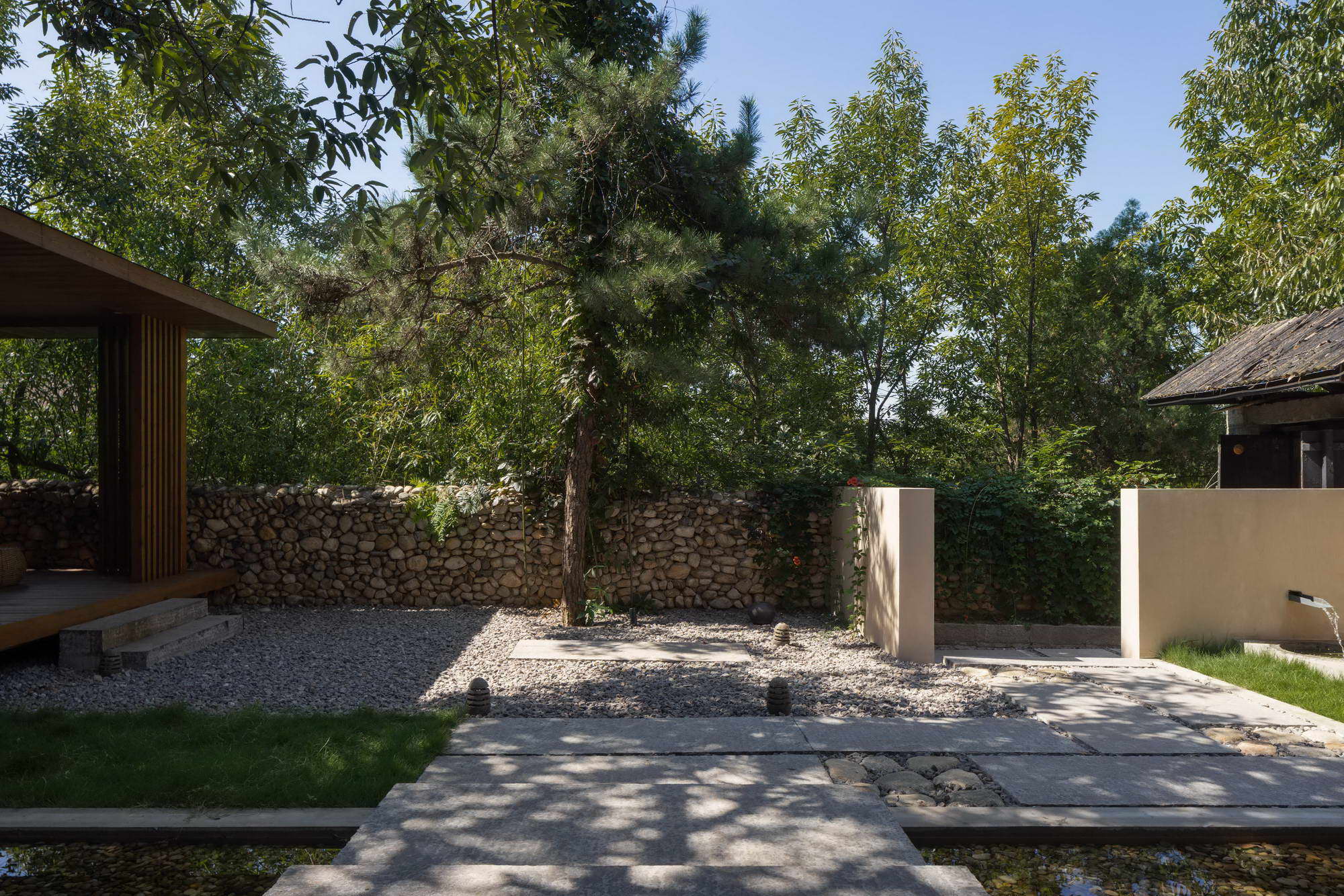
▲看向庭院南侧The Look to the South Side of the Courtyard
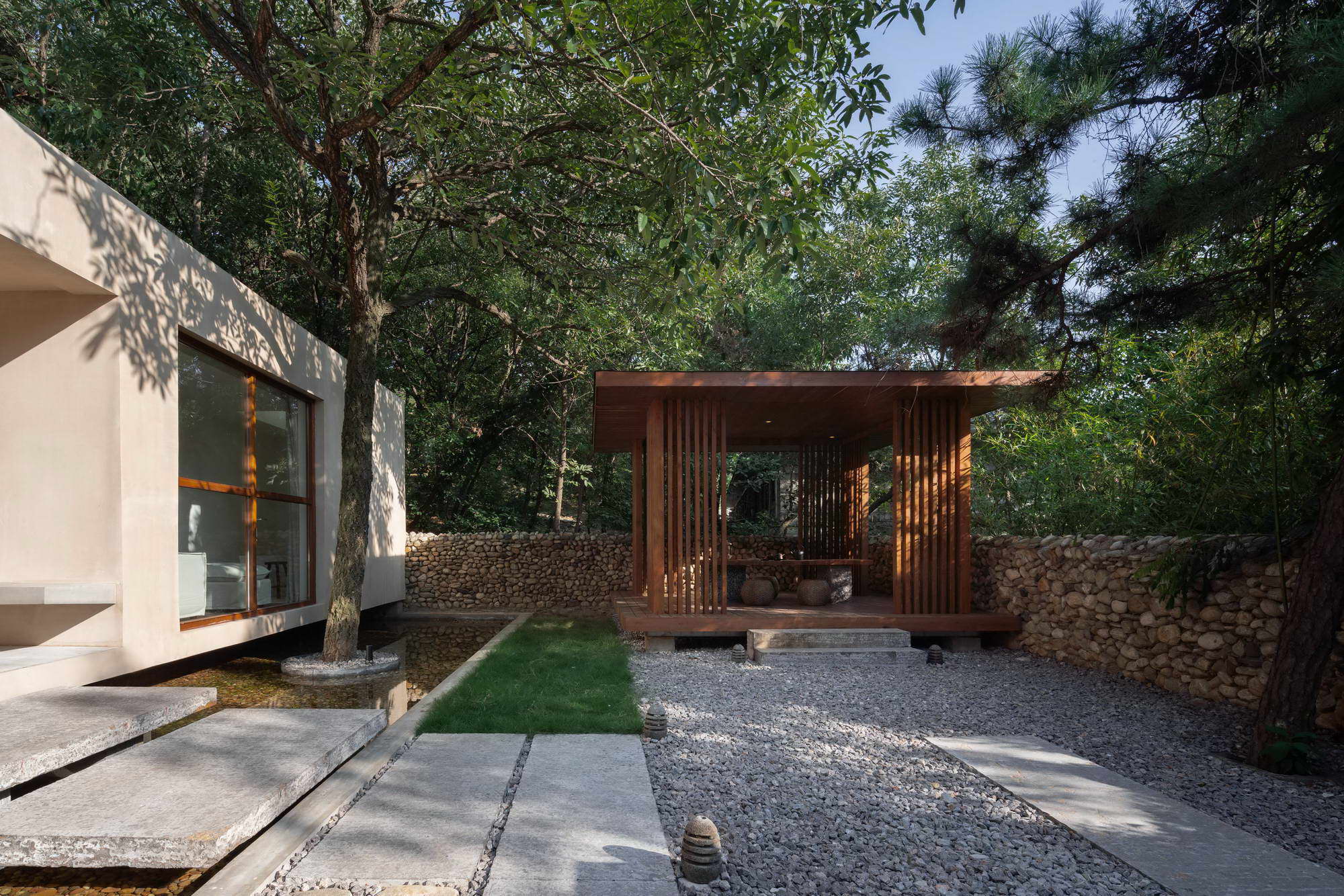
▲茶亭Tea Pavilion
靠近建筑布置了一个浅水池,意将房间同院落及茶亭隔离,形成心理层面的私密性;从茶亭看向建筑,树木打在墙体上的阴影一起倒映在水面上,形成独特的空间氛围。
A shallow pool is arranged near the building to isolate the room from the courtyard and the tea pavilion. In this way, a psychological level of privacy is constructed; looking from the tea pavilion to the building, the shadows of the trees on the wall are reflected on the water together, forming a unique spatial atmosphere.
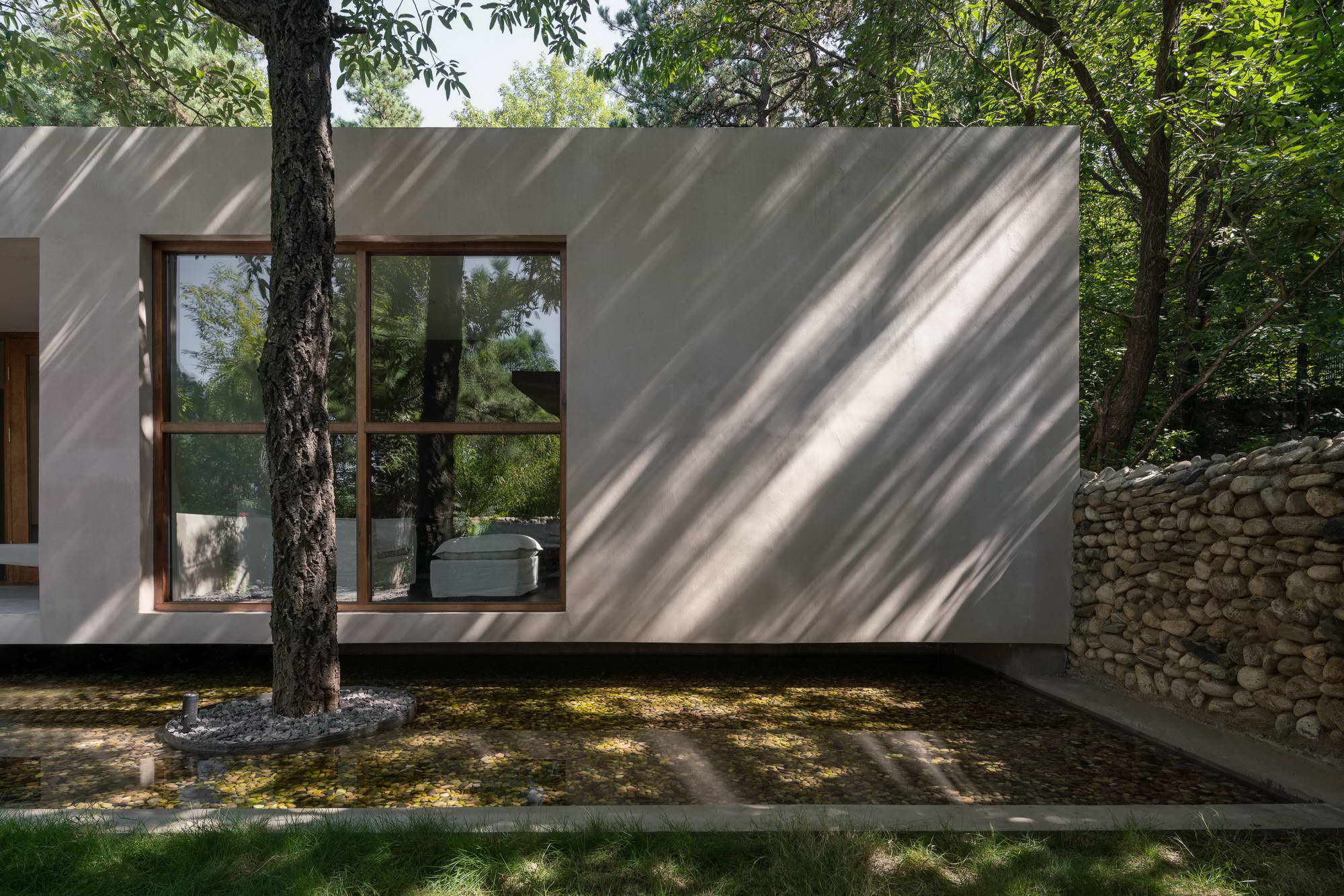
▲水池阴影Pool Shadow
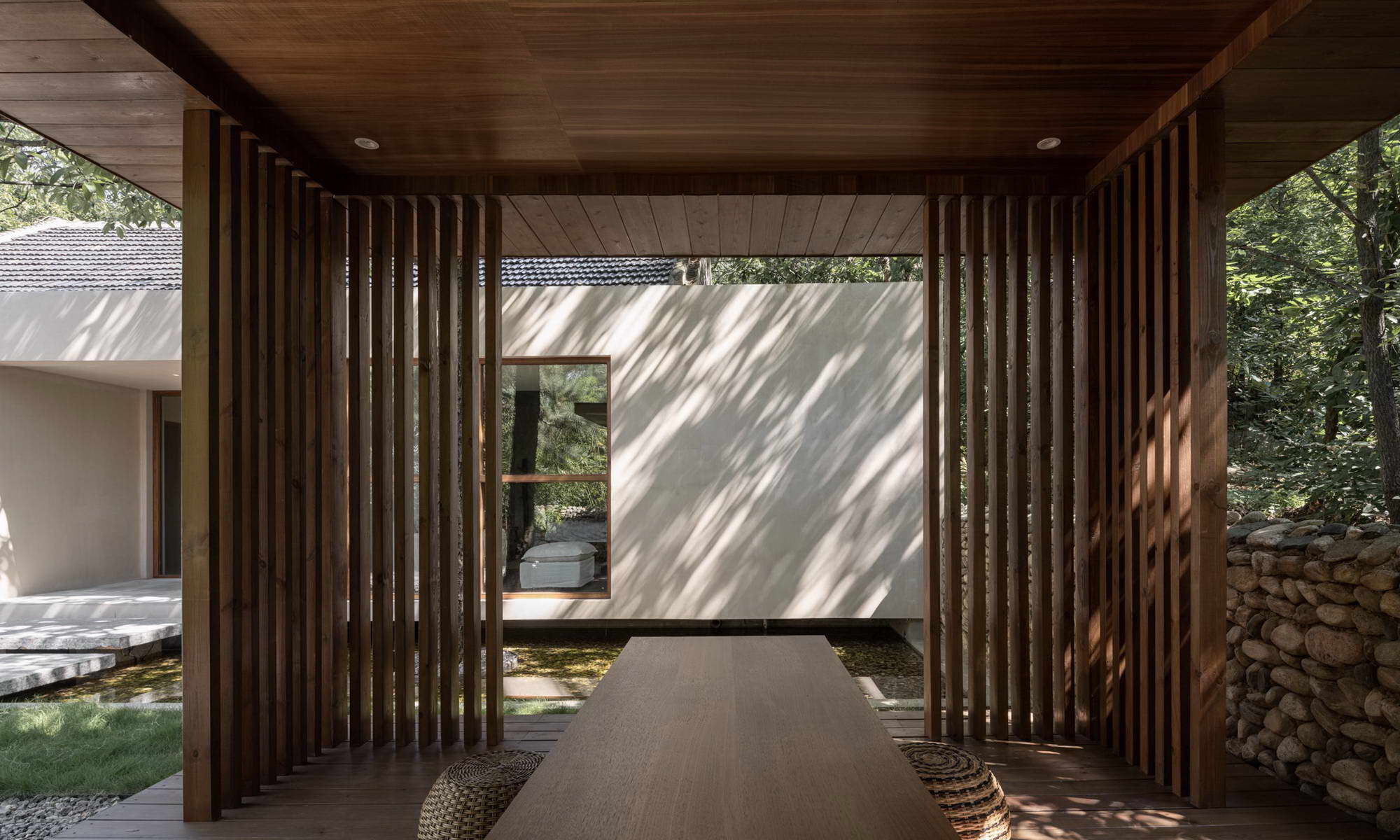
▲茶亭看向主房The perspective from Tea Pavilion towards the Main House
建筑改造:并置体量Architectural Reconstruction: Parallel Volume
主房为坐北朝南的三开间建筑,中间为公共厅,东西两侧各为一间客房,房间开间为3.88米,南北进深为6.84米,改造后仍要保证有两个客房。
The main house is a three-bay building facing south, with a public hall in the middle, and one guest room on the east and west sides. The room size is 3.88 meters from east to west, and the north-south depth is 6.84 meters. After the renovation, there must still be two guest rooms.
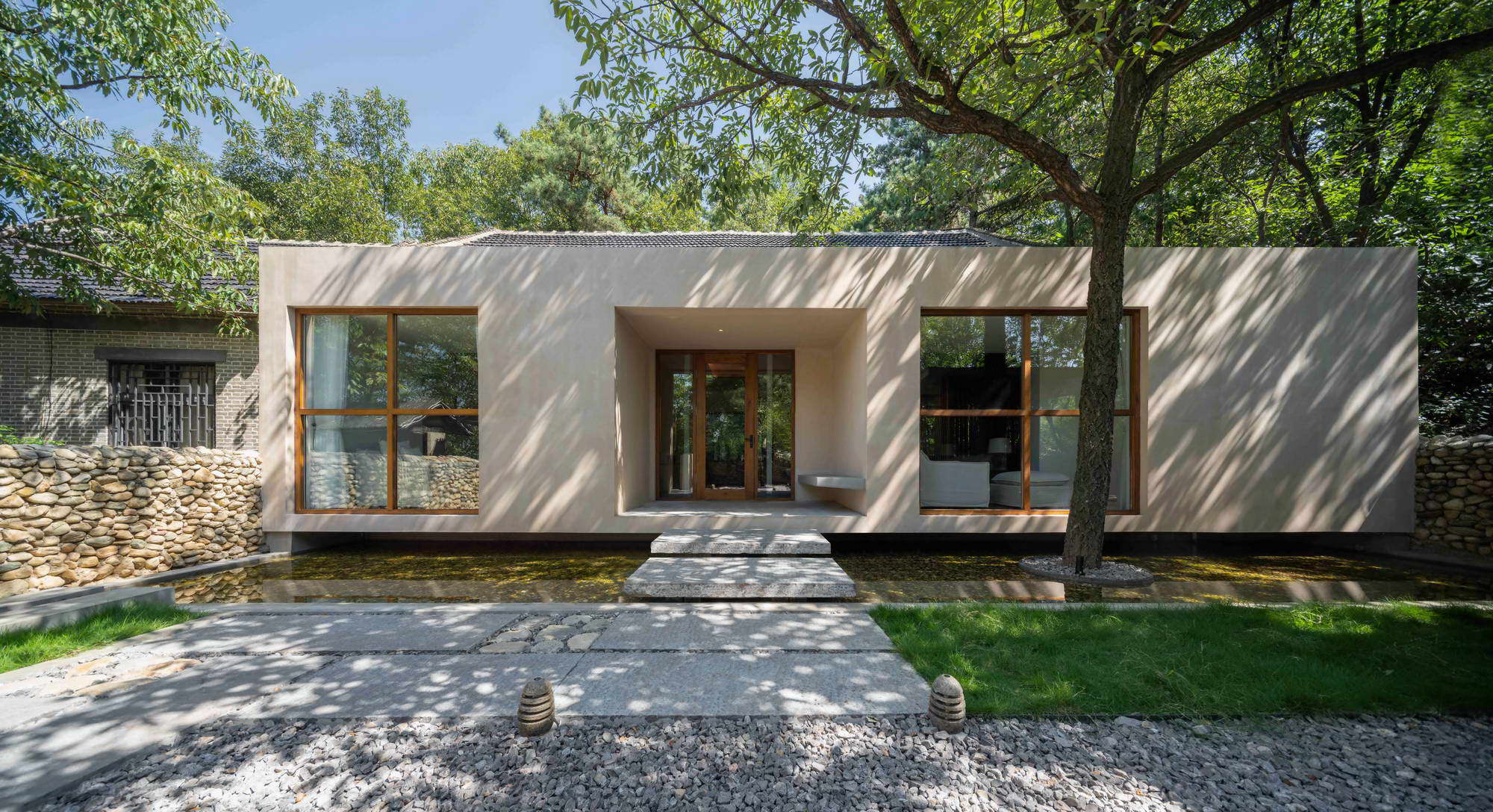
▲主房立面Facade of the Main House
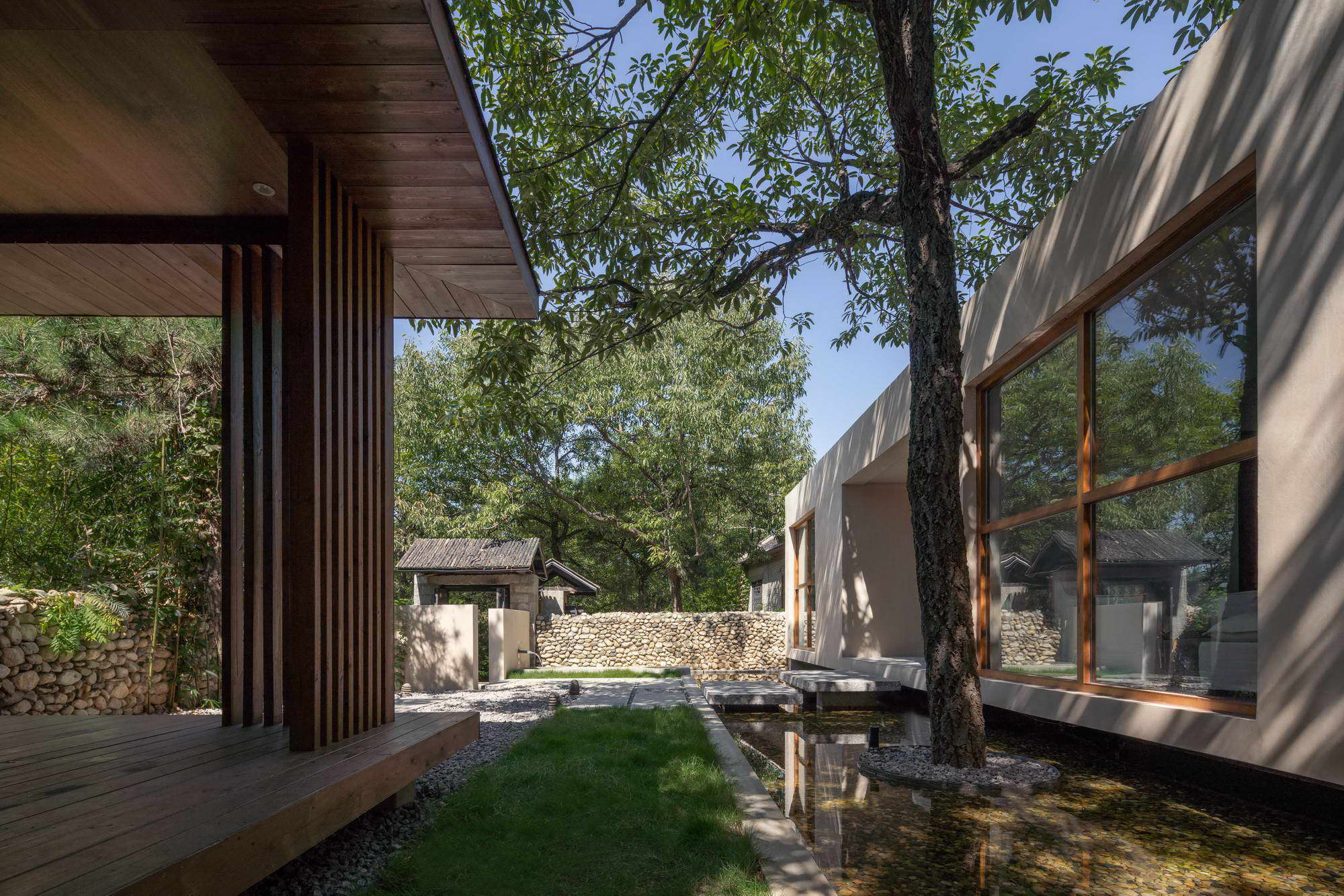
▲庭院Courtyard
原建筑的房间大小难以满足当下度假舒适感需求,如何从根本上解决空间过于局促问题是建筑改造的关键所在,经过反复思考与尝试,决定对原建筑进行加固后,在其外侧并置一个2米宽度的建筑新体量。
The room size of the original building is difficult to meet the current comfort needs for holiday. How to fundamentally solve the problem of too cramped space is the key to the building renovation. After repeated thinking and attempts, it was decided to reinforce the original building and a new parallel volume with a width of 2 meters is juxtaposed on its outside.
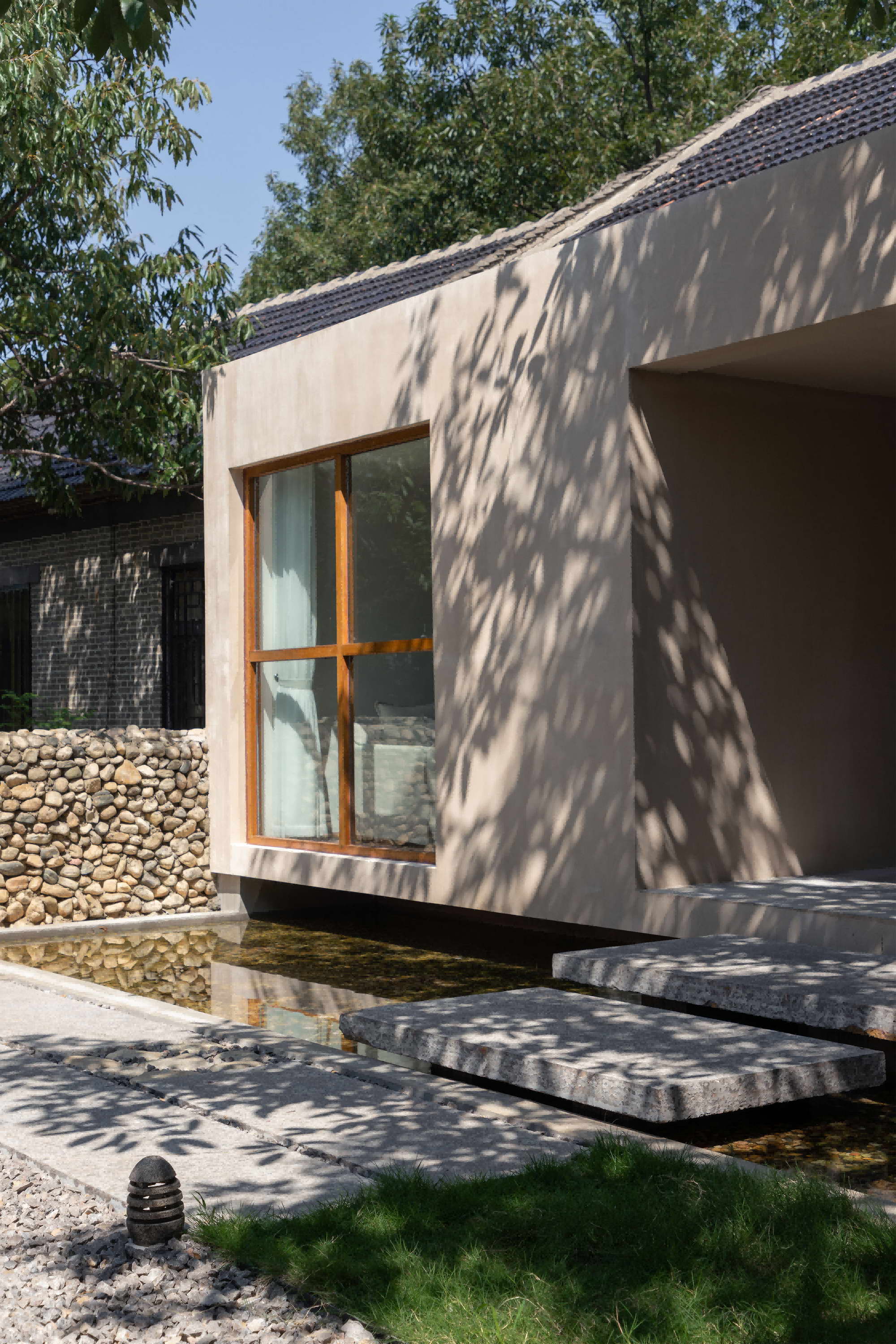
▲树影Tree Shadow
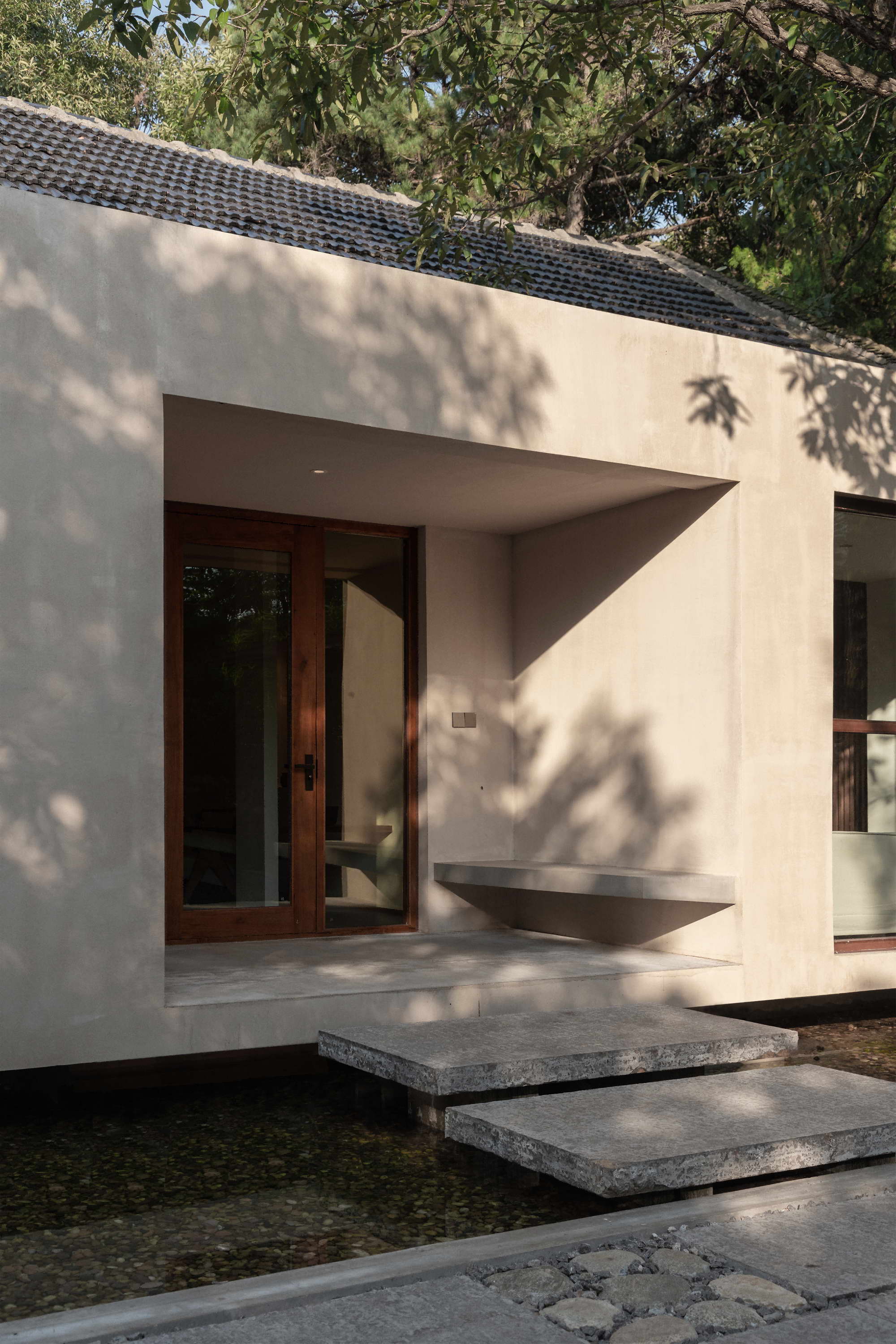
▲主房入口The Entrance of Main House
从庭院看向建筑,加建的体量悬浮在水面上,预示着其背后的建筑主体存在,新体量的置入弥补了原建筑三个房间空间局促的问题,中间部分向庭院敞开,作为进入建筑之前的过渡灰空间,两侧则为两个客房增加了可贵的休闲空间。
Looking at the building from the courtyard, the added parallel volume is suspended on the water, indicating the existence of the main building behind it. The placement of the new parallel volume makes up for the cramped space of the three rooms of the original building. The middle part is open to the courtyard as a transitional gray space before entering the building. Besides, two guest rooms are added with valuable leisure space on both sides.
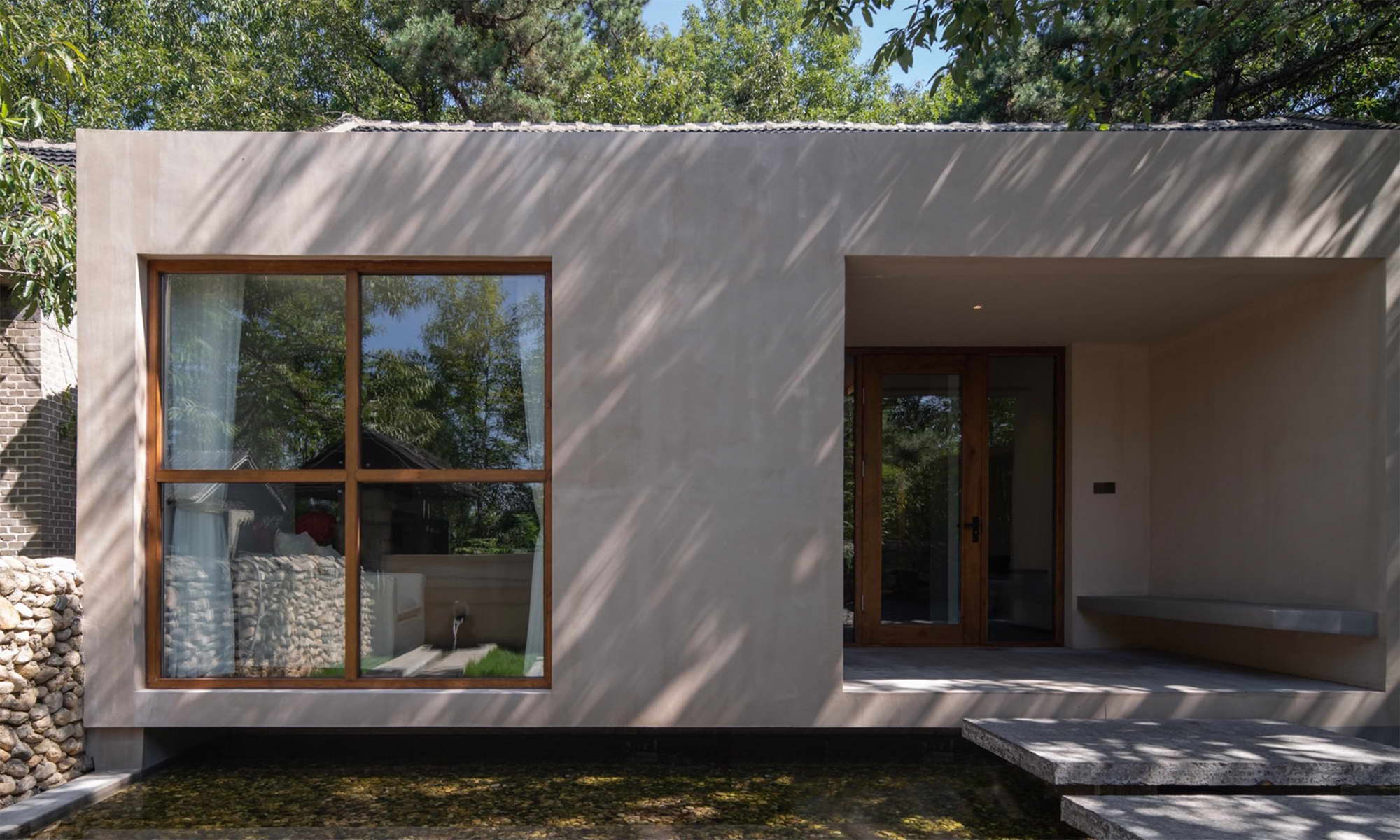
▲主房局部Part of Main House
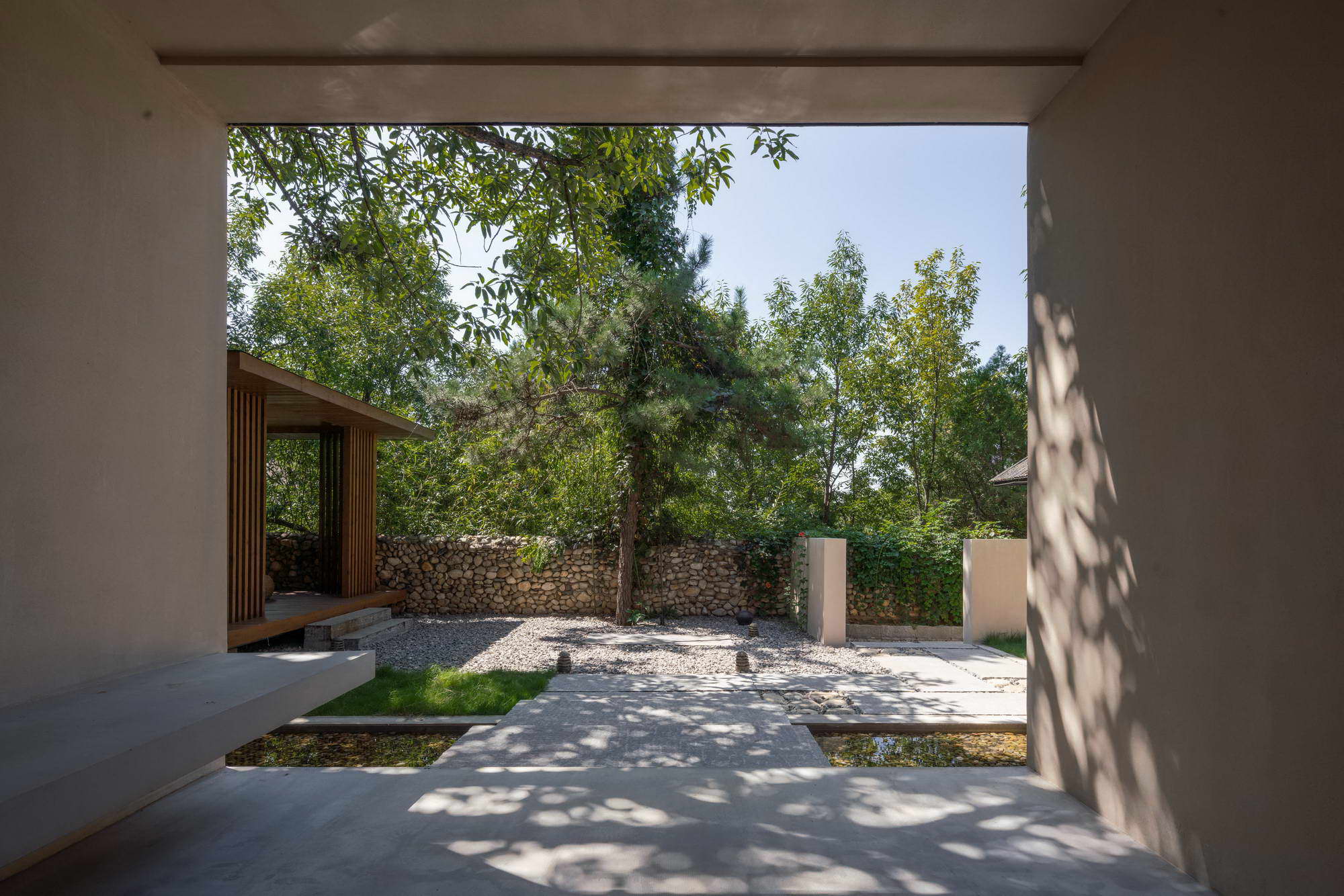
▲入口灰空间Gray Space of Entrance
空间营造:静谧氛围Interior creating: Tranquil Atmosphere
置身院落,这里便是自己的一片天地,室内外空间合二为一,院落空间是室内空间的延伸,室内空间则是对院落空间开敞性的遮蔽。
Staying in the courtyard, here is the world of one's own. Indoor and outdoor spaces are combined into one, with the courtyard space as the extension of the indoor space, and the indoor space as the open shelter of the courtyard space.

▲公共厅局部Part of Public Hall
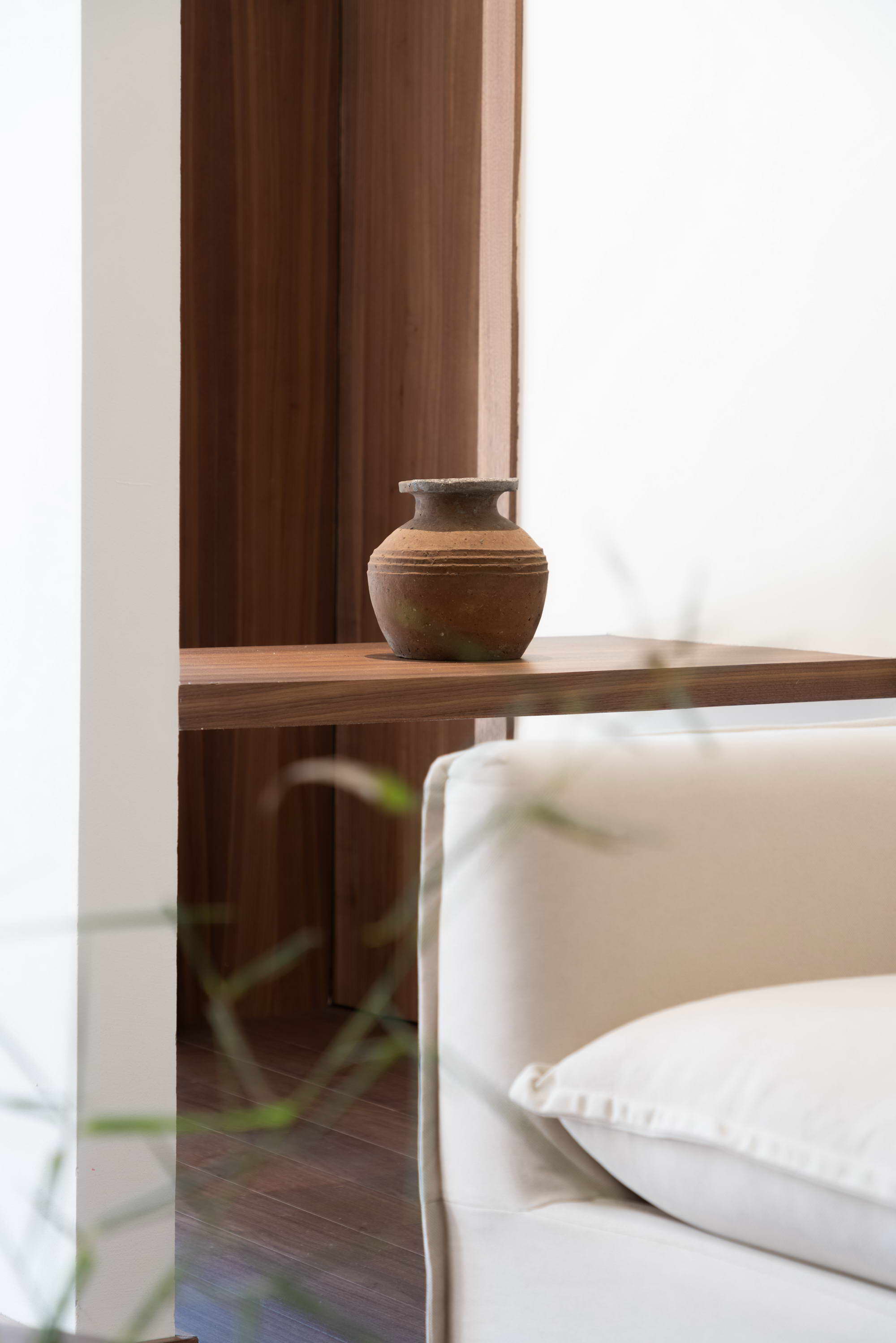
▲当地陶罐Local Clay Pot
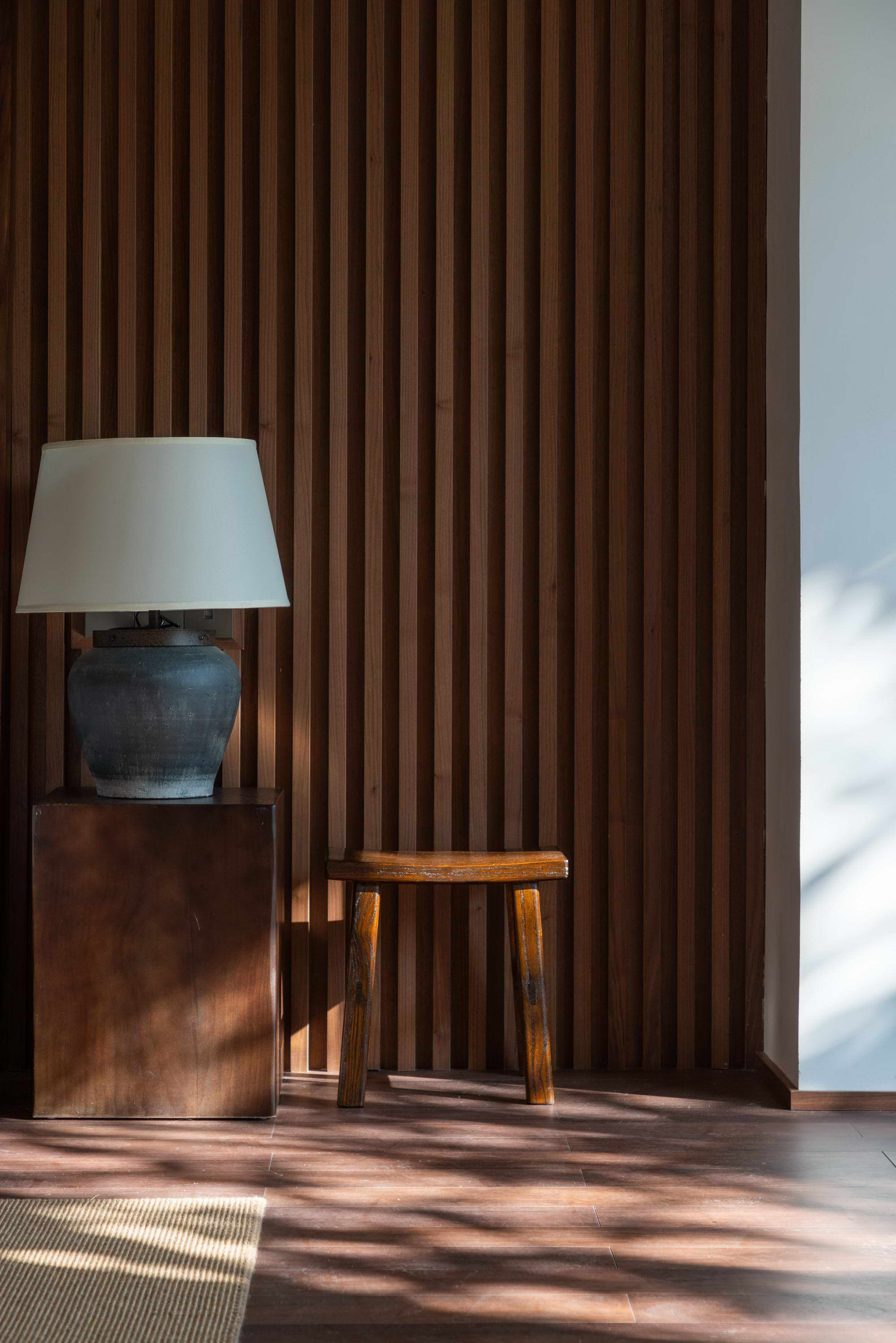
▲客房局部Part of Room
室内保留了原有建筑的三开间形式,中间作为公共空间,两端是客房。简洁质朴的空间,当地的陶罐艺术品,朴实无华的家具,点缀其间的老板凳,时间仿佛在这里停止了流逝,只有光影在墙面上波动,连同外部庭院的绿意,形成了静谧质朴的空间氛围。
The interior design retains the three-bay form of the original building, with a public space in the middle and guest rooms at both ends. Thanks to the concise and clear space design, time seems to stop here, with the local clay pot art, the unpretentious furniture, and the old benches dotted in room. The light and shadow fluctuate on the wall, together with the greenery of the outer courtyard, which forms a quiet and rustic The atmosphere of the space.
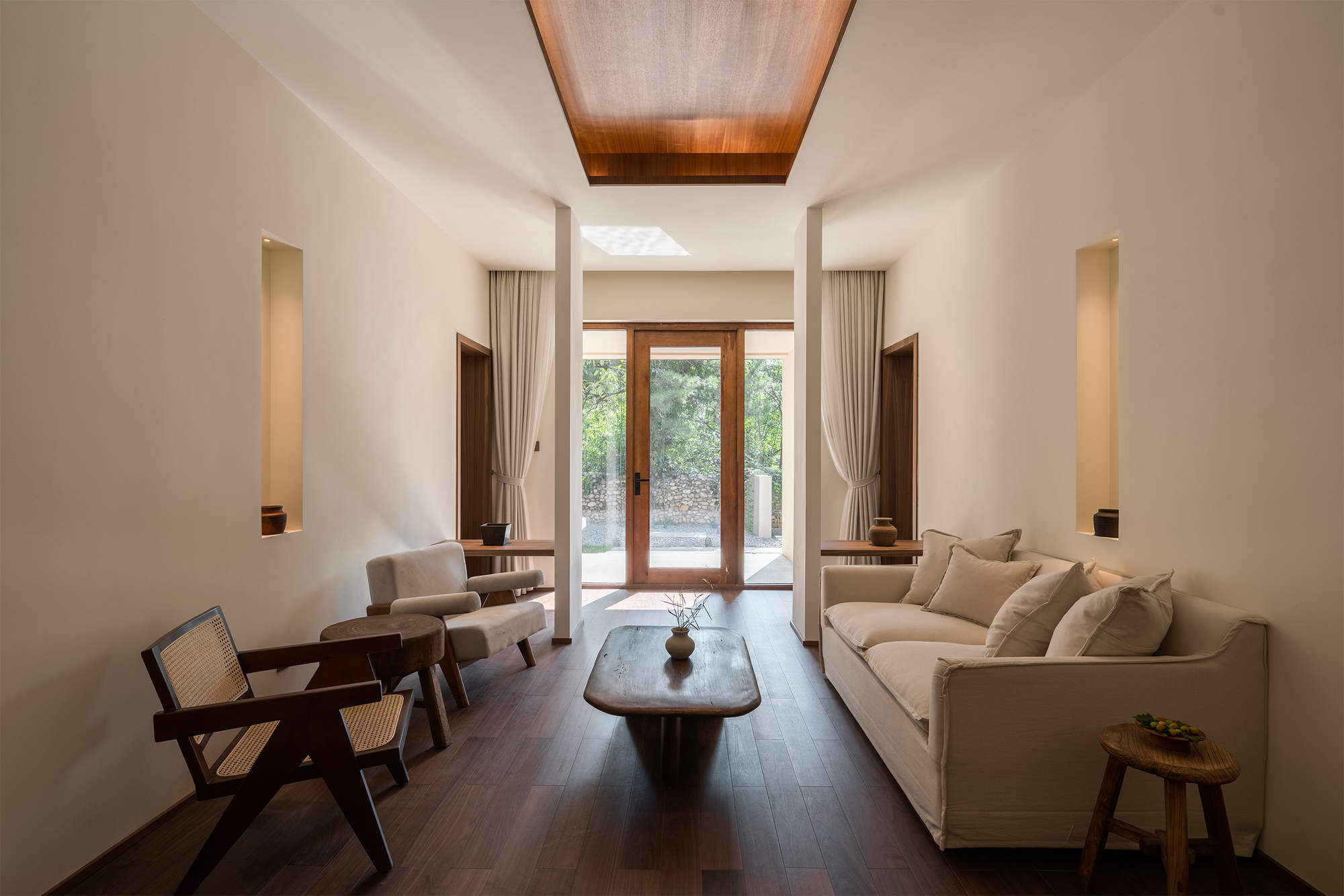
▲公共厅Public Hall
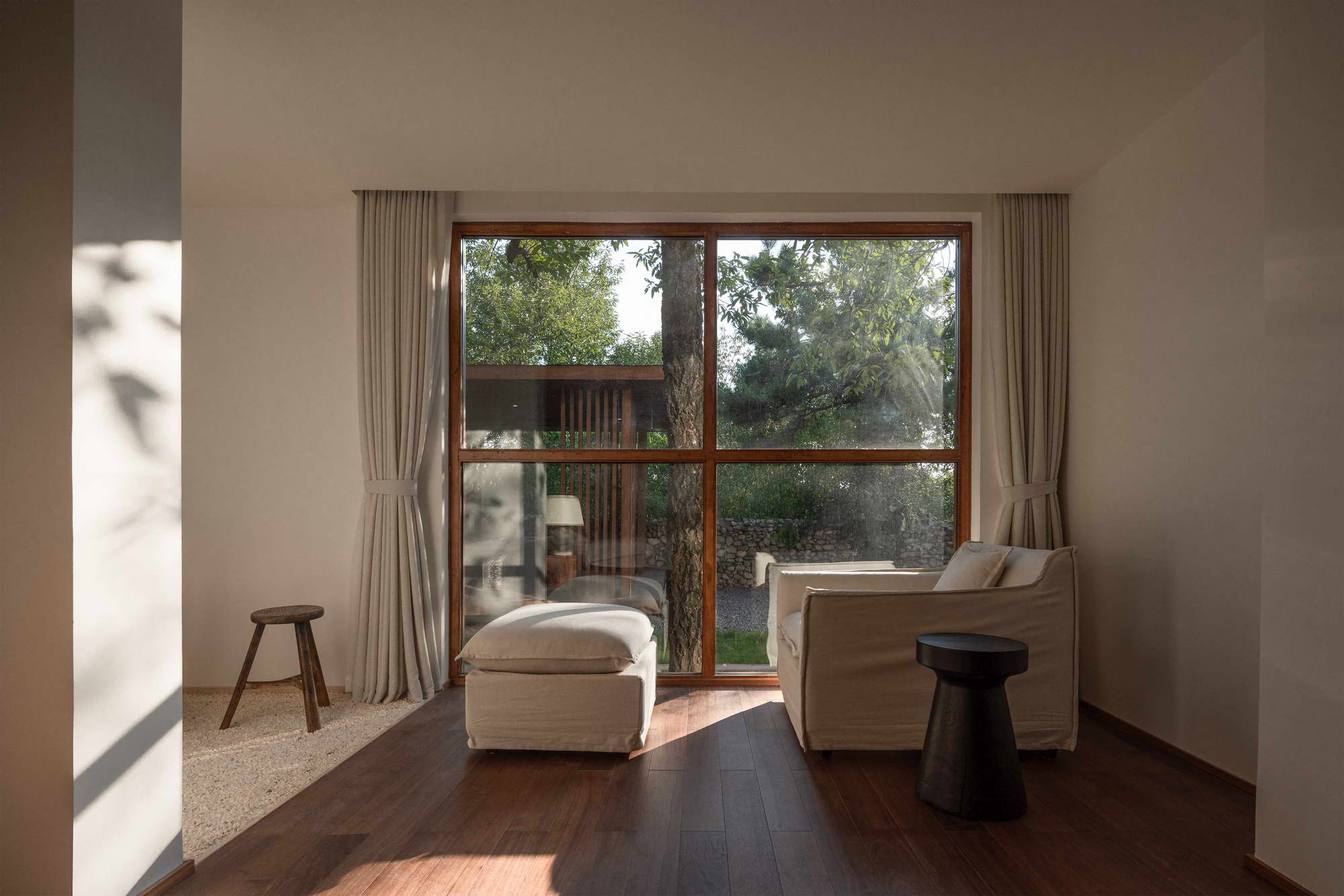
▲西客房West Room
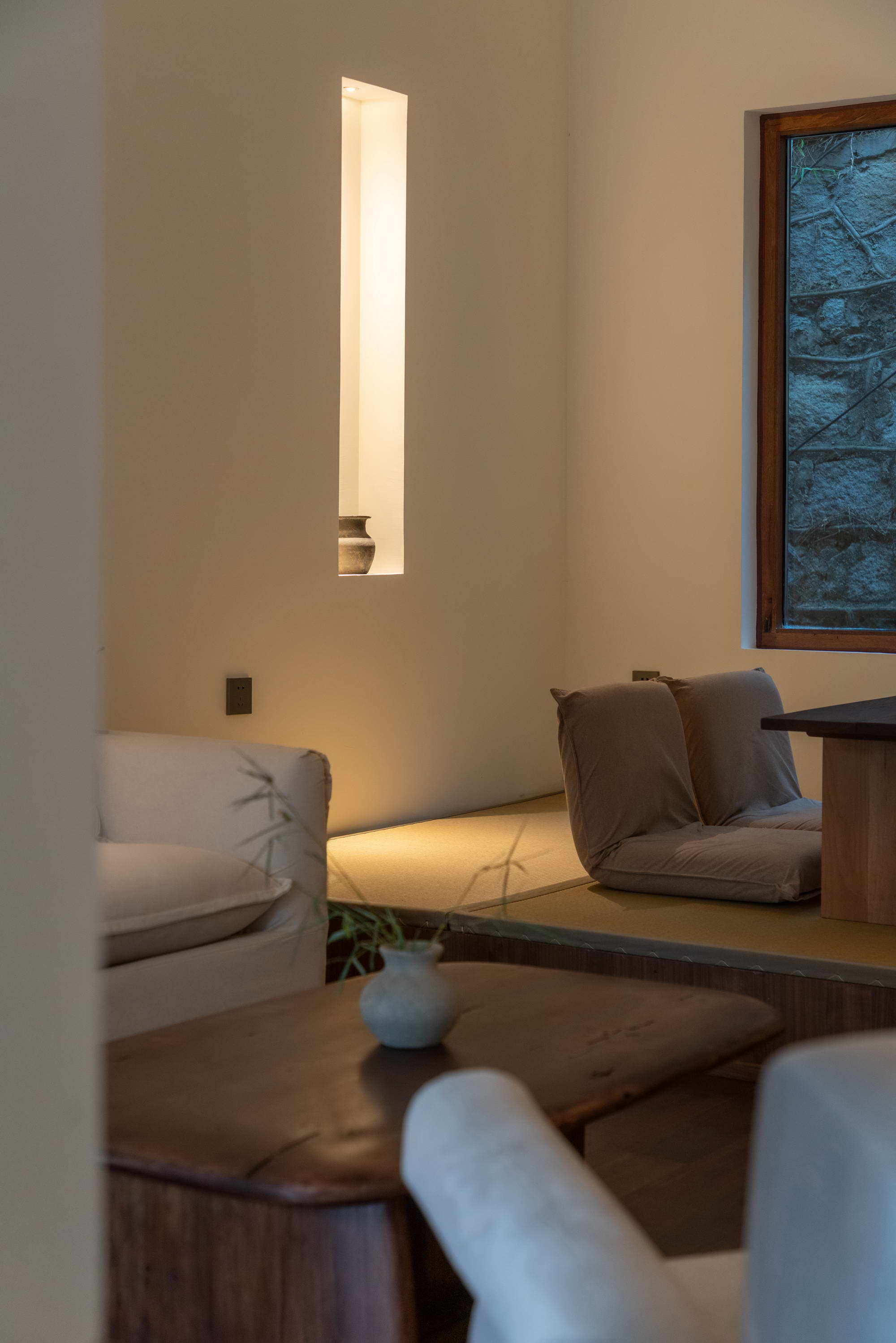
▲公共厅局部Part of Public Hall
透过落地玻璃窗和精心设置的天窗,室内空间同室外的阳光、水面、树影、围墙及周围的树木交相呼应,阳光经树下的水面反射到室内,和直射进来的阳光、树的阴影交织在一起,宛如一场光与影的演出,为静谧质朴的空间增添了恰如其好的灵动。
Through the floor-to-ceiling glass windows and carefully designed skylights, the indoor space echoes the outdoor sunlight, water surface, tree shadows, fences, and surrounding trees. The sunlight reflects into the room through the water surface under the trees, and directly shines through the sunlight and trees. The shadows are intertwined, like a performance of light and shadow, adding appropriate agility to the quiet and simple space.
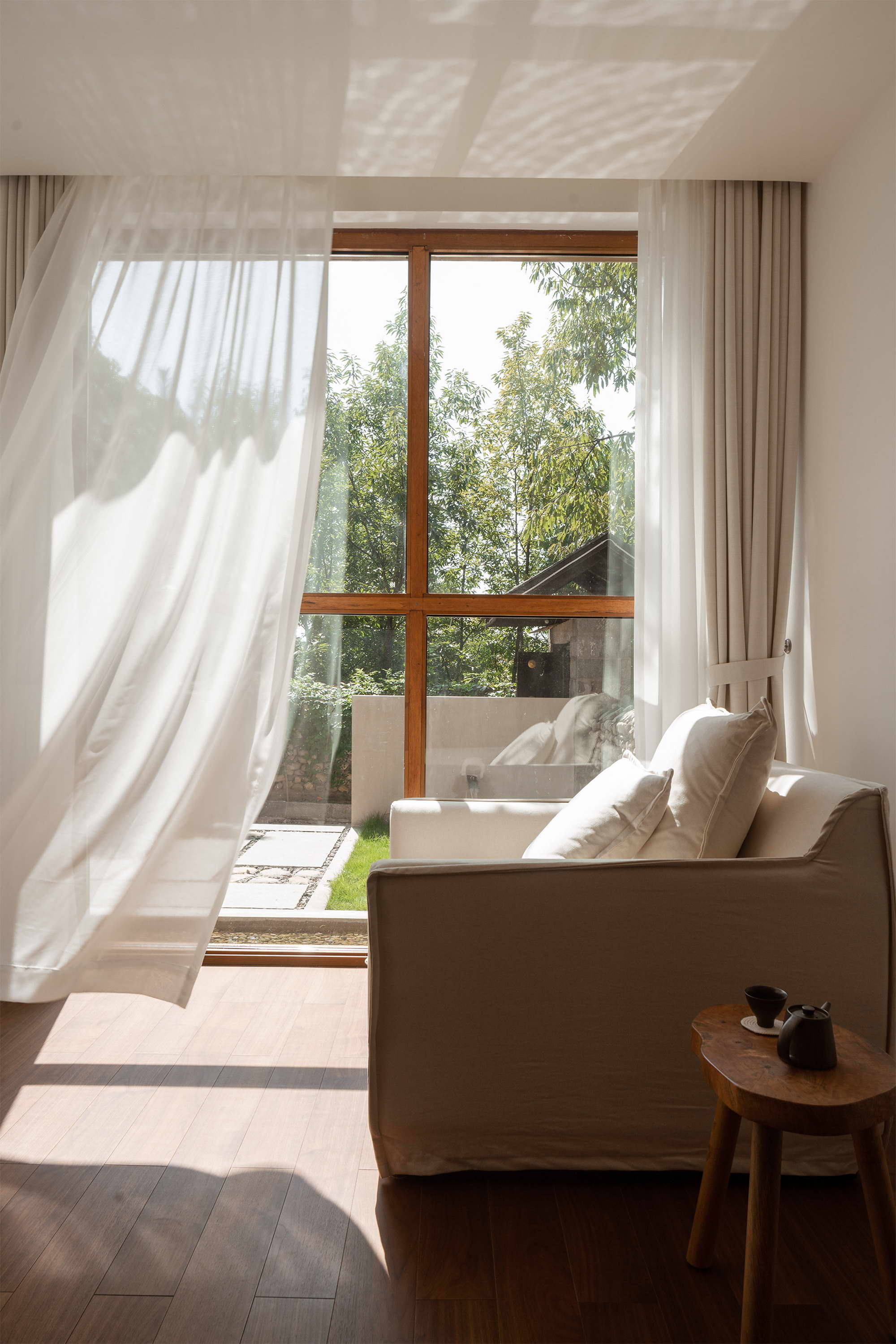
▲客房落地窗Floor-to-Ceiling Windows in Room
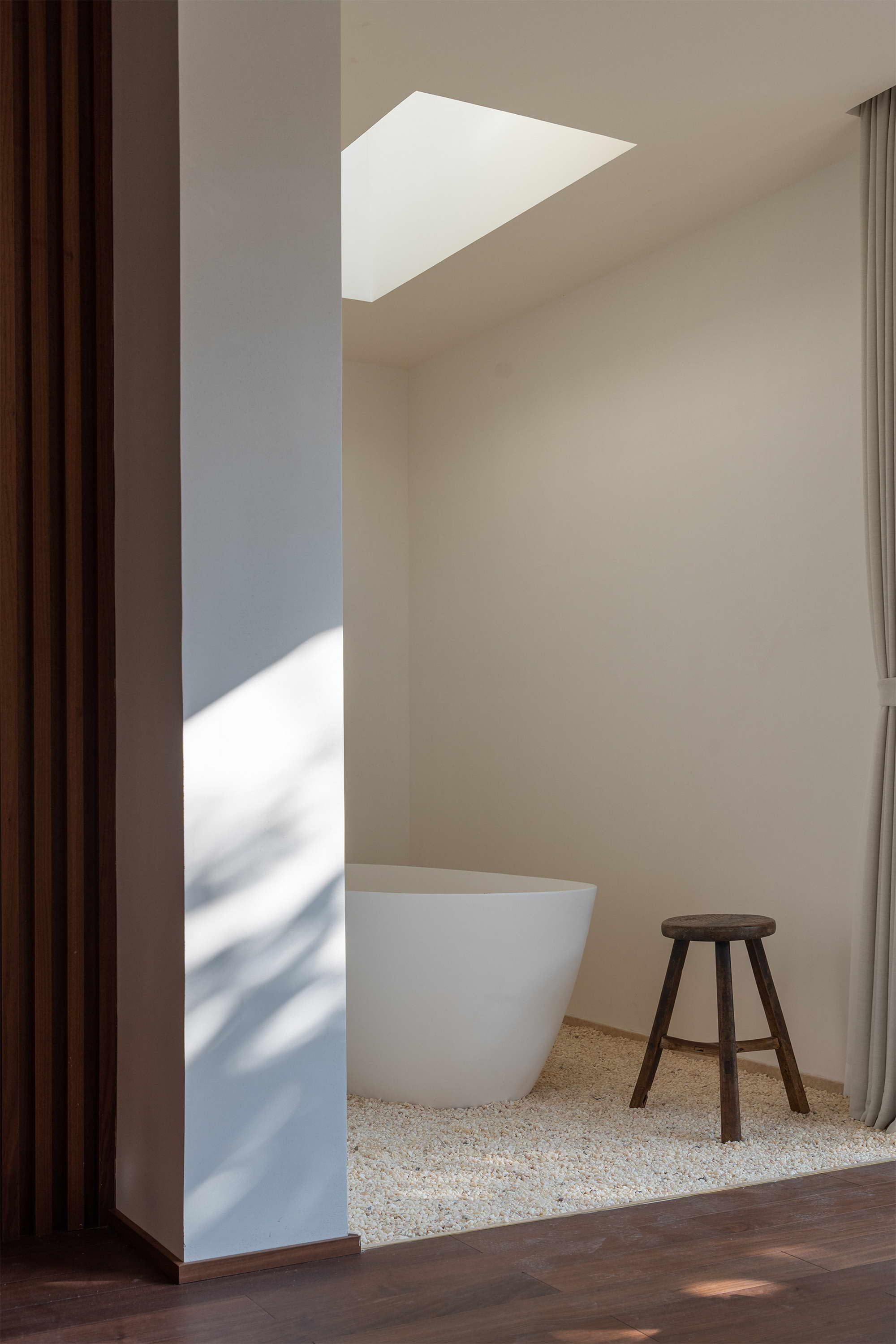
▲东客房天窗Skylight of East Room
设计图纸Design drawing
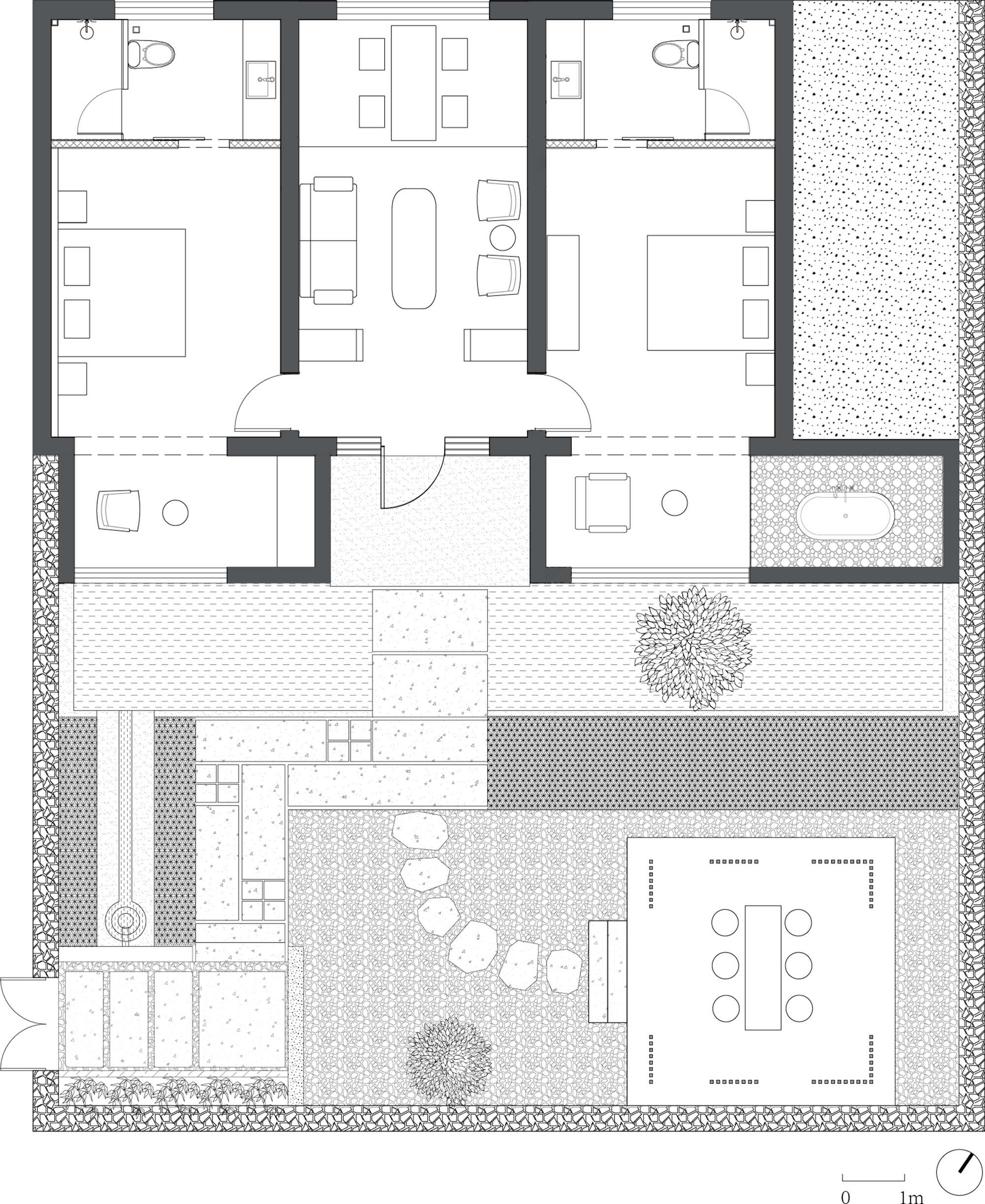
▲一层平面图First floor plane
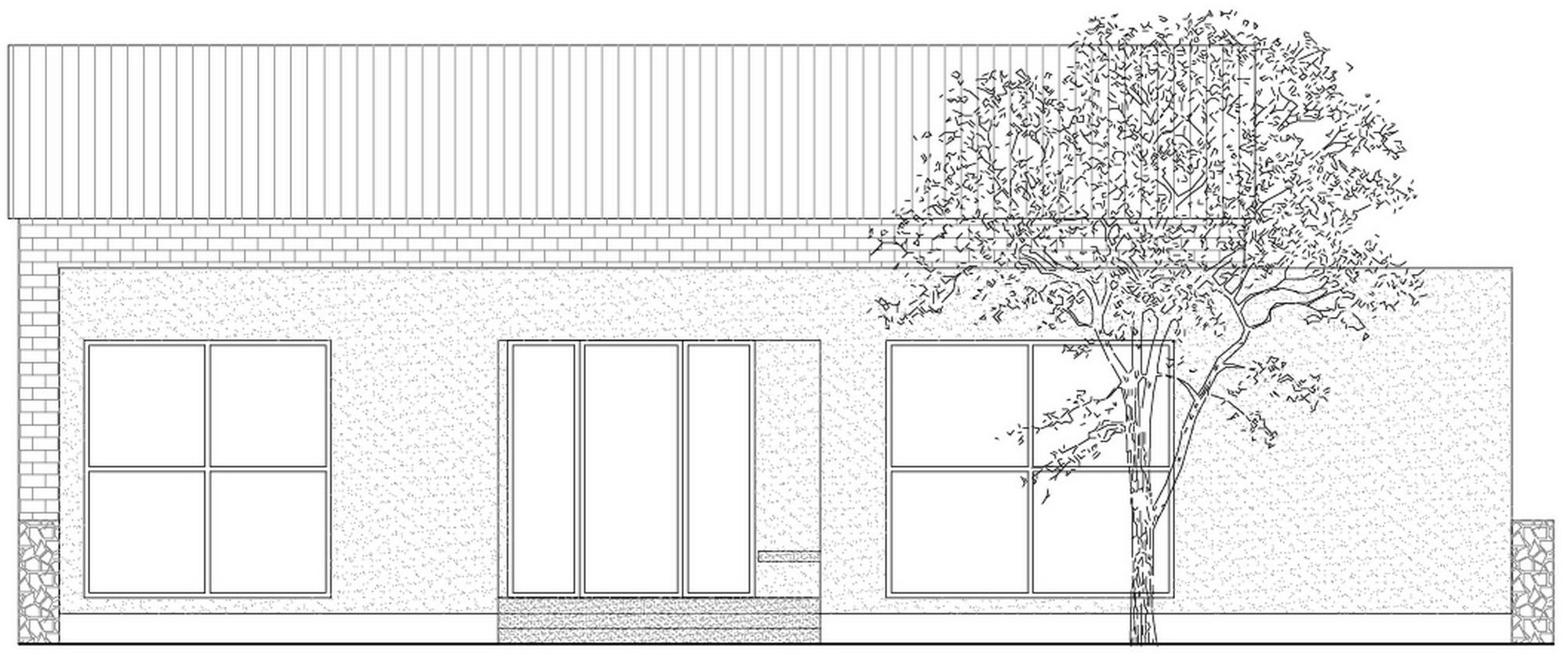
▲立面图Elevation drawing
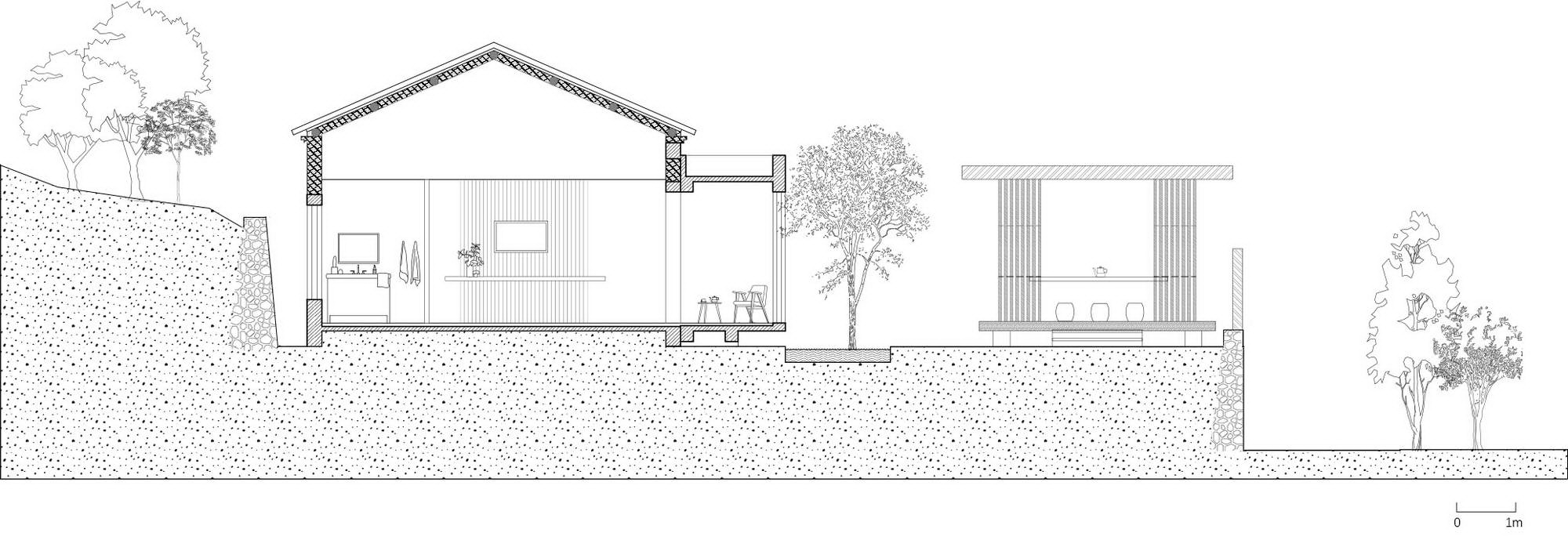
▲剖面图Section drawing
项目名称:沂蒙人家二号院
Project Name: Yimeng Renjia No. 2 Courtyard Resort
项目类型:建筑/室内/景观
Project Type: Architecture/Indoor/Landscape
项目地点:山东省临沂市蒙山
Project location: Mengshan, Linyi City, Shandong Province
设计单位:灰空间建筑事务所
Design Unit: Grey Space Architects
业主:山东沂蒙人家有限公司
Client: Shandong Yimeng Renjia Co., Ltd.
主持建筑师:苏鹏、刘漠烟
Leading Architects: Peng Su, Moyan Liu
设计团队:琚安琪,张莹莹,应世蛟,李园园,张凯
Design Team: Anqi Ju, Yingying Zhang, Shijiao Ying, Yuanyuan Li, Kai Zhang
建成状态:建成
Construction Status: Completed
设计时间: 2019年11月-2020年5月
Design Time: November 2019-May 2020
建设时间:2020年2月-2021年3月
Construction Time: February 2020-March2021
占地面积:240㎡
Area: 240㎡
建筑面积:125㎡
Building Area: 125㎡
结构顾问:邱临宬
Structural Consultant: Lincheng Qiu
施工:山东沂蒙人家有限公司
Construction Company: Shandong Yimeng Renjia Co., Ltd.
材料:青石板、木饰面、木格栅、艺术涂料
Materials: bluestone board, wood veneer, wood grille, art paint
摄影:吴鉴泉
Photography: Jianquan Wu